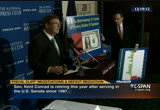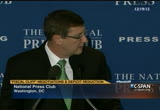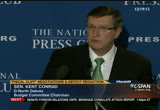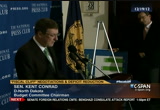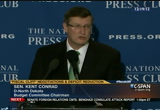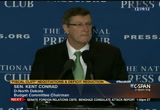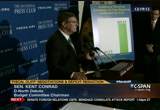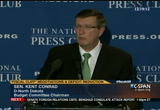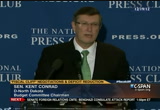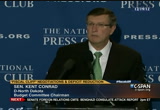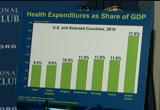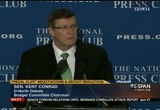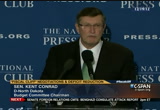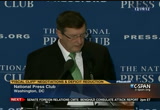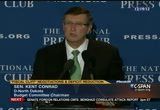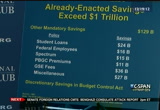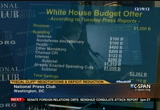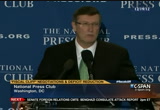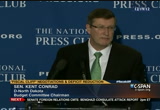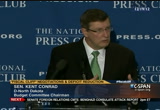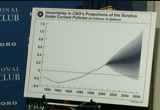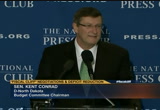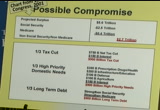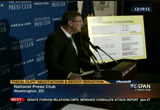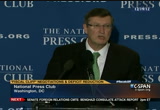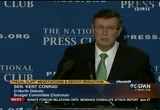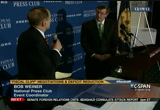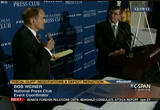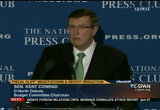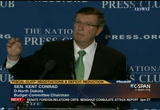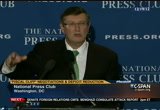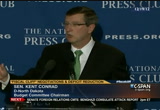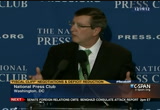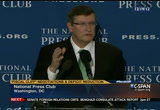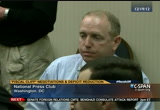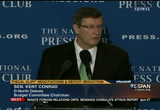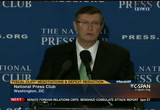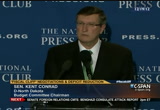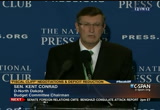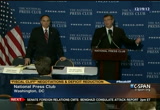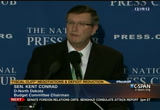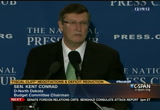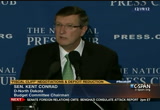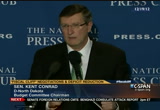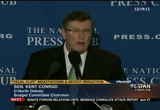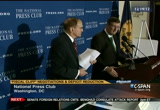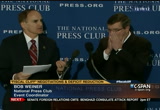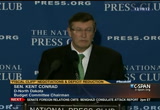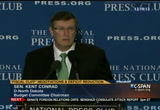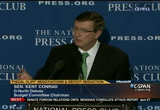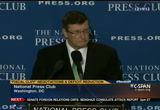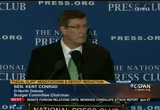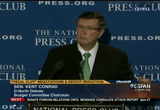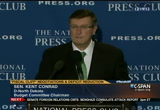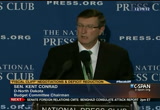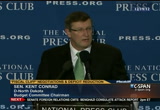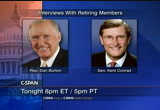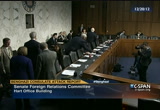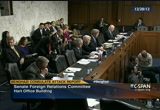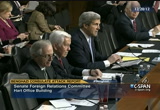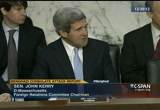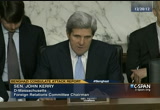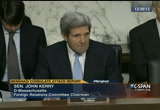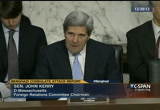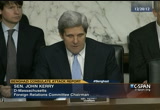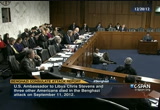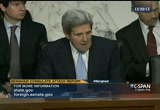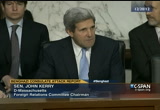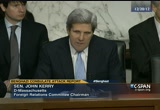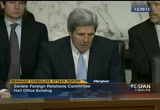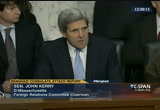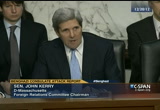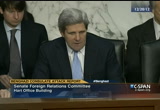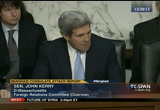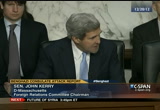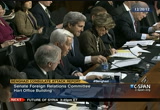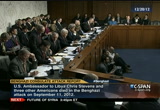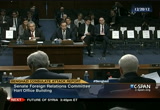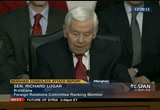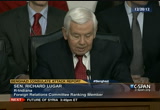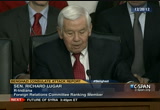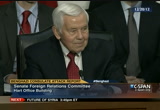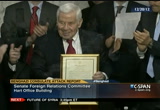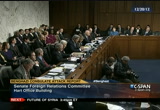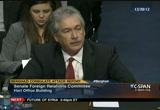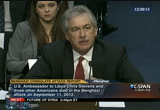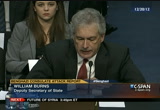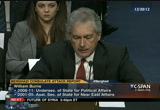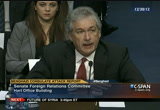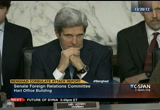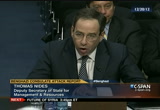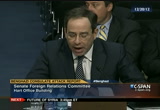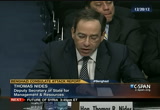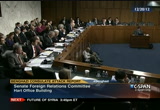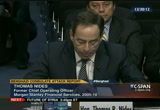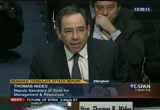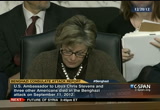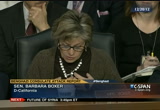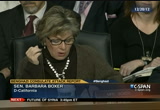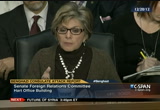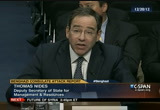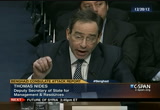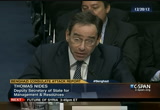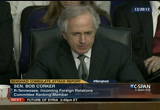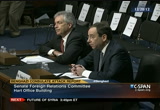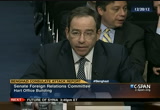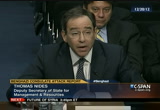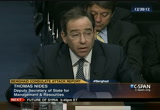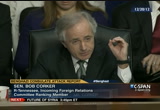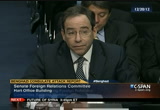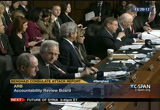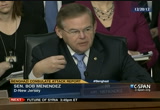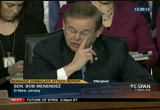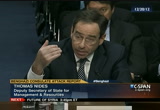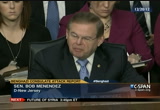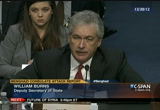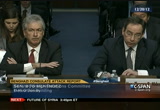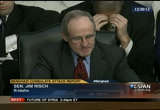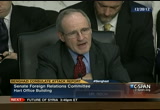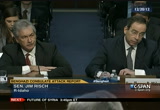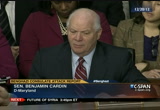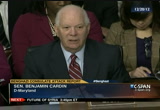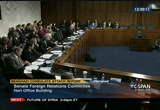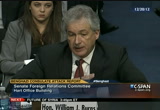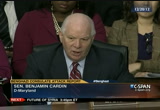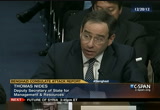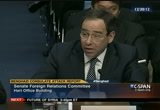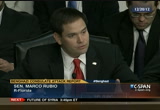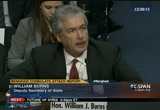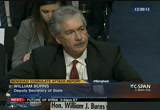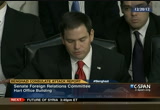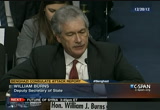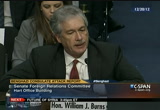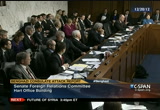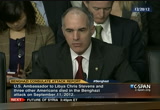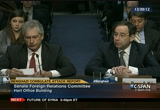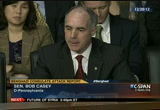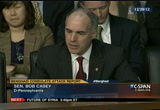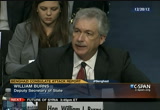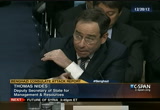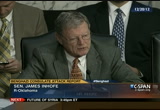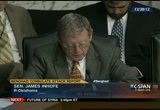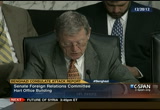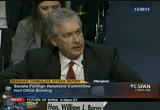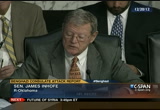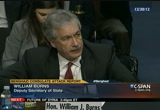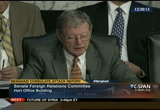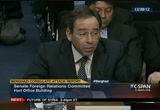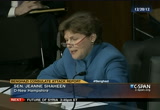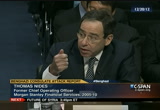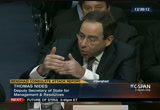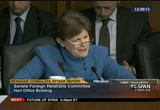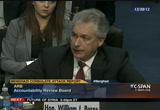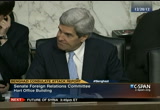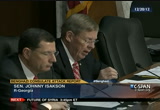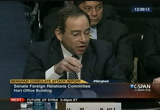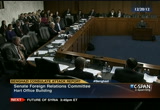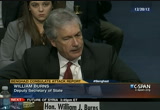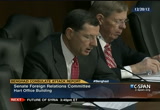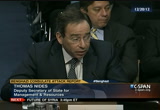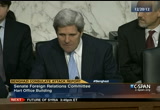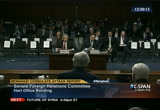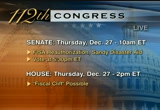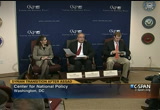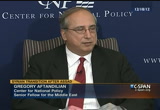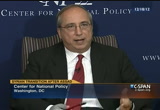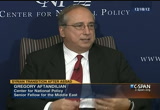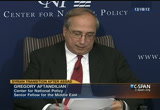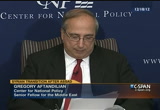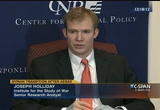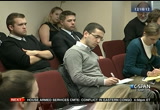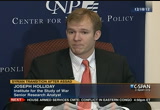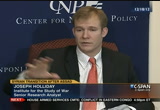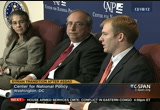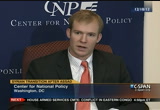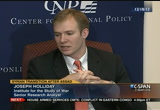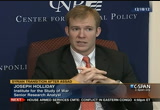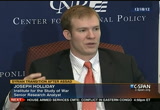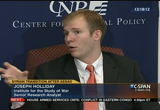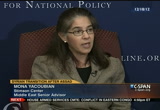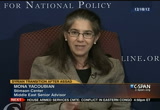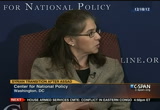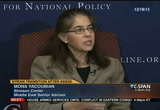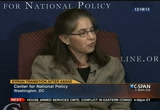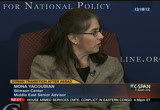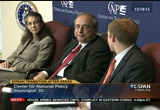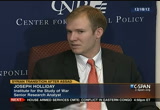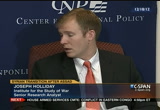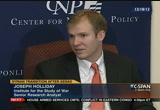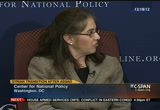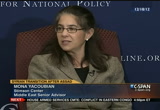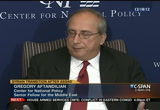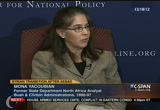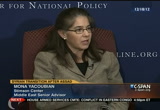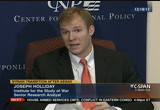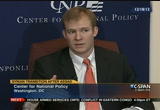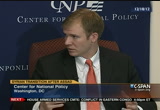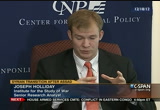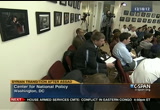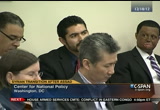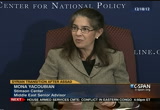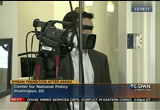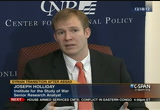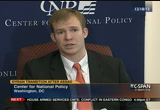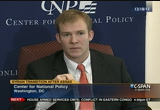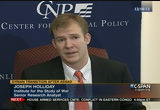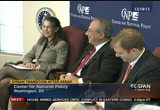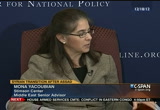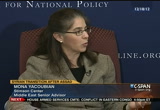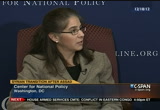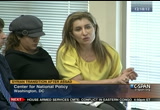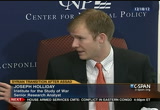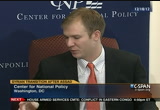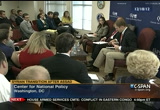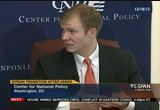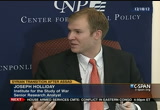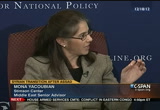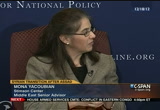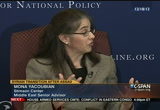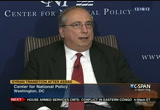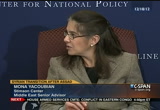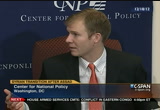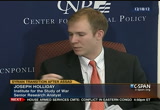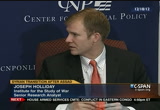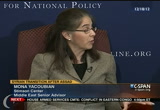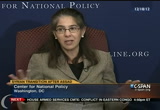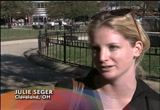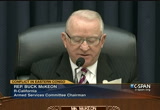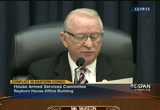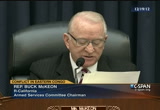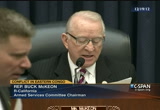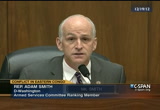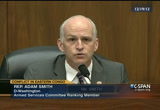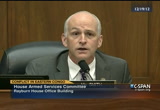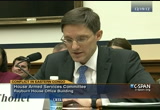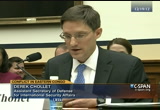tv Public Affairs CSPAN December 26, 2012 1:00pm-5:00pm EST
1:00 pm
now while i believe it is absolutely the case that these actions averted a second great depression, i believe it is also true that we are now facing the consequences. and that is borrowing 31 cents of every dollar we spend. we've seen some improvement because we were borrowing as much as 40 cents of every dollar we spent. clearly that is unsustainable. it is going to require action. and i think most people who have studied this understand we have both a revenue and a spending problem. this chart i think demonstrates it quite clearly. this looks at the relationship between spending that's the red line and revenue, that's the green line, going back to 1950. so this is looking at 60 years of our spending and revenue history.
1:01 pm
you can see that we are near a 60 year high. we've come somewhat off it, we're near a 60 year low in revenue. that says to me we've got to work both sides of the equation. those who say we've got a spending problem have it half right. we also have a revenue problem and both sides have to be addressed. our gross federal debt surpassed 100% of our g.d.p. this year. it is projected to rise to 115% by 2022. the definitive work on death studied 200 years of financial history, looked at dozens of countries and concluded once you reach a gross debt of more than 90% of g.d.p., your future economic prospects are affected in a negative way.
1:02 pm
you have reduced economic growth once you get to a gross debt of more than 90% of your g.d.p. as you can see, we've passed that marker. we are over 100% of g.d.p., we are headed for 115% of g.d.p. if we fail to act. this is why many of us have called for action. it was six years ago this month that senator greg and i first came up with a commission to address the debt. that eventually led to the president naming the simpson bowles commission. -- its part son report bipartisan report recommended 40 trillion in deficit reduction. we need to stabilize the debt
1:03 pm
and work it down is a package of about $4 trillion over ten years. here we are today, december 19, and these law changes which i referenced earlier, the end of the bush era tax cuts, the dreaded sequester, across the board cuts of $1.2 trillion in spending will begin to take effect the first of next year. the good news is the white house and republicans have been trading proposals and at least yesterday appeared to be moving closer together. i would have much preferred that they would be talking about a bigger package than they've discussed but nonetheless to reach a package that would resolve some of these issues
1:04 pm
would be an important step forward and i think help promote certainty that would be important to our economy. on the revenue side of the equation, i just want to remind you what it's taken in the past to balance the budget. we hear talk on average revenue is in the 18% of g.d.p. range n. getting back to average you will should be sufficient. the problem with that is we have never balanced the budget in the last 50 years based on 18% of g.d.p. in revenue. balancedtimes we've going back to 1969, you can see that revenue has been about 20% of g.d.p. you can see from this chart. 19.7% of g.d.p. in 1969. 1999 it was 19.8%. twow,000 it was 20.6% and 2001 19.5%. so my own belief is the chance of balancing the budget is
1:05 pm
going to require a revenue share of g.d.p. in the 20% range. that's why i tried hard to convince my colleagues on simpson bowles that should be our goal. we adopted the goal of 21% in light of the baby boom generation which is going to make additional demand on the retirement programs. we know that is not a projection because the baby boom verse been born, they are going to retire and be eligible for these programs. so if we are going to keep faith, if we are going to keep the promise that has been made, my own view is 20% of g.d.p. is the bear minimum.
1:06 pm
a're going to need something bit over that to get through this period. what seems to be lacking to me is any sense of perspective in these discussions. so the president calls for $1.6 trillion of additional revenue over this next budget period. and people say oh my god, that's a huge tax increase. sit really? the latest number apparently they are talking about is in the $1.2 trillion range. the president started at 1.6. but how much are we going to raise over the next ten years? we're going to raise over $378 trillion with no change. so $1.2 trillion increase is.32% of what we're going to raise. we can't have a 3 or 4% increase in revenue? really?
1:07 pm
is that the situation where when we've got a revenue level right now that is near a 60 year low as a share of g.d.p. and we can't increase over the next ten years the revenue base of the country by 3 or 4% to help get this deficit under control? the same is true on the spending side. let's go to that chart because we see -- maybe before we do that, i should talk about the cap gains and how we raise this money. because not only the amount of money is important but it is also important to talk about how we raise it. most of the focus has been on the earned income tax rate.
1:08 pm
when we hear about going from 35% to 39.6%. that is focused on the earned income tax rate. very little attention has been paid to unearned income. those are taxed at a rate of 15%. earned income is taxed at a rate of 35%. so there is a 20% differential. when i came to the senate t capital gains rate was 28%. i have not heard any convincing argument that we need a 20% differential on unearned income compared to earned income. let me give you an example that martin sullivan wrote about in a tax notes article. he looked at a building and we could isolate on and look atta just that building. that one building on park
1:09 pm
avenue in new york, the average income for the residents was $1167,000 a year. the average income. the average tax rate was 14.7%. and ovebling that is because of the difference between unearned income, capital gains and dividends and earned income. now at the same time he looked at a new york city janitor who might be working in that building. their average income $33,000 for the same year but with a tax rate of 24.9%. so the janitor who might work in that building is paying a tax rate ten points higher than
1:10 pm
the people who live in the building who have an average income of over $1.1 million. anybodyknow how justifies that as a fair sharing of the burden in this country. and warren buffet has been very clear as one of the wealthiest people in the world, certainly one of the wealthiest people in this country that he find it's prosperous that he pace a tax rate a 23r5x of the tax rate -- that he pays a tax rate that is a fraction of the tax rate paid by his executive assistant. so i would hope that in any
1:11 pm
final agreement that unearned income would be taxed on a basis more coatly equivalent to what earned income payers pay. now on the spending side of the equation we've had a lack of perspective. you've seen speakers calling for 600 billion in healthcare savings over the next ten years. the president said a lower number f. -- lower number. if we take the president's reported to be his most recent number of 400 billion in savings in healthcare over the next ten years. what are we going to be spend on healthcare over the next ten years? over $11 trillion. so at the president's number the spending would represent 3.6% of what we're projected to spend in healthcare over the next decade. we can't save 3.6%? really? you know we're in a situation where 5% of medicare beneficiaries use half of the money. 5% of the beneficiaries use half of the money. certainly we can save 3.6% by
1:12 pm
doing a better job of coordinating the care of people who are using most of the resources. we've done enough studies i think to conclude we could deliver better healthcare and save money by better coordinating the care of those who are using most of the money. you look at the overall circumstance in this country in terms of what we're spending on healthcare. for 2010, which is the most recent year we have comp sons. 2010 we were spending 17.6% of our gross domestic product on healthcare. the next highest was france and germany. united king come 9.6. and germany and france on many measures are getting better healthcare out comes than we are.
1:13 pm
and we know if you fast forward to 2012 we're not spending that, we're over 18%. 1 in every 6 dollars in this economy is going to healthcare. and however much one saves on healthcare, 40% of that flows through to the federal government because the federal government is paying 40% of healthcare in this country, actually something more than that. there is lots of room to save money in this healthcare system and there by save money in medicare and medicaid. we're talking about a very small percentage about what we intend to spend over the next ten years in the savings that are being discussed. the same is true on discretionary savings. the president called for $200 billion.
1:14 pm
discretionary savings on top of the billion that has been done. but if we put it in perspective we're going to spend in the domestic accounts in the next ten years $11.6 trillion. so a $200 billion savings is 1.7% of what we're forecast to spend. we really can't save less than 2%? of course we can. i think we've as a country, both sides talk about the big headline number and they don't put it in perspective. how much are we talking about in terms of revenue. as a share of the revenue we're going to raise over the next ten years. how much are we talking about saving in these accounts in relationship to how much we're going to spend? i think this is lack.
1:15 pm
-- is lacking. i think if it was added it would change people's views about how difficult or how not so difficult these changes might be. other mandatory spending. the president talks about savings there on a base of $5.1 trillion. that's a savings of 4% in other mandatory accounts. things like ago gri culture -- things like agriculture where we have passed in the senate a farm bill that saves $23 billion. that is certainly something we could do. let's go to the next if we could. so already an act of savings from the budget criminal act and i hear all the time the senate hasn't passed a budget resolution for three years. instead of a budget resolution we passed a law called the
1:16 pm
budget control act. and that budget control act in many ways was much stronger than any resolution because as all of you know a resolution never goes to the president for his signature. a resolution is purely a congressional document. the budget control act was a law and it not only set the spending levels for two years, it set the spending levels for the next ten years. it put in place ten years of caps saving $900 billion. it provided for the sequester, an additional across the board cut of 1.2 trillion if the special committee couldn't reform entitlements and the tax system. so it provided over $2 trillion in spending cuts. that's the biggest spending cut package in the history of the united states. it was all in the budget control act, something that was
1:17 pm
put in place instead of a budget resolution. and the savings that were in the budget control act exclusive of, separate from the sequester is over $1 trillion. you can see student loans 24 billion. federal employees 16 billion. >> over a trillion dollars of savings in the budget control act. so if we rack up what is report reported to be the most recent white house offer. whitet say this was the house offer, i'm taking this from press reports.
1:18 pm
1:19 pm
1:20 pm
extenders are being treated because that cost another $800 if we're going to extend those provisions. we don't know how the dock fix is being handled because those doctors are going to take a cut of 28% if nothing is done. that cost ability $240 billion over ten years to fix. if all of those things were done an offset that would dramatically reduce the savings of this package. but we don't know. i've heard and read press reports saying that overseas contingency operations, so called war cost are being used as an offset to the minimum tax or perhaps the doc fix and that i've read may amount to as much as $800 billion. so i don't think we have sufficient information to really know how big a deficit savings this package might provide. we simply don't know how the
1:21 pm
alternative minimum tax is being handled. we're told that they want to prevent additional people from being swept up by the alternative minimum tax and we know if changes aren't made some 30 million people in this country will be affected by the alternative minimum tax up from about 5 million currently. so that is a high priority to deal with that. it cost a lot of money to fix. we also know that the tax extenders are a consideration. we know that if all of them are extended, that cost $800 billion over ten years.
1:22 pm
we've not seen the off sets for that or if they intend to have off sets. so that has to be taken into consideration when we have additional information. now i was asked to reflect back when i took the ranges of the senate committee. they issued a report of surpluses of $5.6 trillion over the next ten years. and yat you how much times i -- and i can't tell you how many time i showed this chart to my colleagues trying to persuade them to be betting that 5.6 trillion was going to come true was a risk i was not willing to take. and i said i didn't think as a nation we should take it. the notion that that $5.6 trillion in surplus was really going to happen was based on a
1:23 pm
projection. so i took the projection from c.b.o. and showed my colleagues that the 5.6 trillion is right in the middle of their forecast. you can see by the disparity in this fan chart, you could have a lot more than 5.6 trillion, you could have a lot less in surplus according to the c.b.o. projections depending on what happened. so i urged my colleagues to be cautious and not have tax cuts that used up the whole surplus because it could plunge us right back into debt. and guess what, not much heed was paid to those warnings. the tax cuts were passed. and we are left in a circumstance that we now confront coupled of course with
1:24 pm
the economic downturn at the end of the bush administration that dramatically added to deficits and debt and the subsequent actions take on the prevent -- taken to prevent further erosion in the economy. at the time i look back on what i proposed to my colleagues and i'm very proud of it. because if they had followed my plan at the time, we would have been in infinitely better shape. proy posed the following took -- i proposed the following. the projected surplus of 5.6 trillion and backed out the social security and medicare that were forecast .9 trillion reducing the surpluses to 2.7 trill i don't know and divided that amount in thirds. a tax cut of $900 billion. $900 billion dollars for high
1:25 pm
priority. -- high priority domestic needs, including domestic drugs. a hundred billion for defense and agriculture and $150 billion of cost associated with that expenditures for a total of $900 billion to pay down long term debt, to strengthen social security and medicare and put us in a stronger position going forward. how i wish that plan had been adopted are rather than the one that was adopted. how much better off we would be as a country if the plan that i laid before my colleagues back in 2001 had actually been adopted. this is the chart actually i
1:26 pm
used from the 107th congress laying out this plan. i told you so doesn't get you much in life or in this town certainly. but when i reflect back on my service and tenure here, i do wish i would have been able to more successfully persuade my colleagues to take a different course. i wonder how much different would the circumstance be facing the country had that proposal been adopted instead of the bush era tax cuts which were shoe horned into a ten year period because they knew they couldn't pay for them beyond the ten years. and they were limited by budget rules in the senate. so they shoe horned these oversized tax cuts into a ten- year plan that created the cliff that we confront today.
1:27 pm
so this was a man made problem and it's given to man made solution. it doesn't do much good to look back now. what we need to do is spend our efforts and energy in trying to achieve a plan that will carry us forward. i still am optimistic we can do that. i'm hopeful that we will do it. if we don't do it in the next several weeks before the new year, i hope it is done immediately there after. i think it would be better for the country and economy and people's confidence in the act of this country to make decisions and govern wisely if we were able to make an agreement before the end of the year. and that is still possible despite the u turn from the speaker yesterday. i hope that the discussions continue and prove conclusive.
1:28 pm
with that i want to thank you for this opportunity and i'll be happy to answer questions people might have. >> we will take questions. the questions will be first from members of the media and national press club members and then if no hands are raised after that we will go to others. >> senator i want to tie some things together in terms of your great, informative powerful knowledge based so speech and ask a question that brings us into focus given current continue verse sis. your wish list for the debt and people programs combining it. president obama stated something similar for the future. he said we should take half of the war fund and use it for deficit and half for people programs.
1:29 pm
and he stated that we spend more than the top ten countries in the military come bind and it's disproportionate, we can do that. can we really do that with the military contractors doing what eisenhower long ago says the is the military industrial complex, can we do that? is that better than to pull the money from social security and medicare where -- remember i told you worked for the chief of the staff aging committee under him. and he worked so hard to protect social security and medicare. and the deal we have protects it to 2035 and beyond if the economy improves. seniors have paid in to social security and medicare and actually there is a surplus because of that which is what
1:30 pm
the folks are trying to pull out of and use for these other purposes now. isn't it better to do what president obama has proposed and perhaps if we have the political will to use some of the military funding for our deficit situation? >> i don't think have we have any choice but to have further savings in defense. but to be fair there are not enough potential save there's to deal with our problem. our problem is so much bigger than we can get out of domestic discretionary accounts including defense. if we look at where we're headed, we're already at 100% of g.d.p. on our debt. we're headed for 130% debt to g.d.p. if we fail to act. and while i believe we need to have additional savings in
1:31 pm
defense, the president proposed 100 billion over ten years. that is way short of the 4 trillion that most economist say is necessary as a package. that's why i thought what we did in boles simpson as a basic approach made a lot of sense. if you take simpson bowles and look at the revenue that was in that package compared to what asproposed now, it's twice much. you read all the time simpson bowles had 1.2 trillion of revenue. not right. ed the 1.2 trillion of revenue -- it had $1.2 trillion of revenue after a baseline judgment that assumed the top
1:32 pm
rates for the top 2% would not be extended so that's 1.2 trillion on top of the 800 billion that that baseline change would raise. so simpson bowles, please understand had 1.2 trillion of revenue but that was on top of a baseline change of 800 billion. because the underlying assumption was the tax breaks for the top 2% would not be extended. that was the starting point. then they added 1.2 trillion of revenue. so for the years in question the total revenue was 2 trillion. but now we've added additional years because that was back in 2010. when you add the additional years starting from a base of 2012 and you look forward, you see that the simpson bowles revenue would be $2.4 trillion. we also had greater defense savings in that package than are currently being discussed
1:33 pm
because the budget control act had 470 billion in savings the -- had roughly $487 billion in defense savings the president is calling for a total of $a570 billion. on social security boles simpson called for changes but changes not as part of a deficit reduction package but to be treated separately so any changes to social security were to secure it's solvency long term. by 2033 social security will be insolvent. that doesn't mean it won't be able to make payments. it will only be able to pay 75% of the promises that have been made. it should not be done as part of a deficit reduction.
1:34 pm
it should be done to secure the solvency of social security. healthcare little different circumstance because that is the 800 pound gorilla. if you look at growth as a share of g.d.p., the healthcare accounts interest on the debt, that's where it's at. it's not in the discretionary accounts or social security. the place we are having very significant growth of a share of g.d.p. is in the healthcare accounts. and as i indicated as a nation we are spending so much more than anybody else and the other countries that are advanced are actually with less expenditures a share of their national income are getting better healthcare out comes. so there say chance for savings -- so there is a chance ofor savings without hurting
1:35 pm
beneficiaries and with actually improving the competitive position of our economy. >> richard man will give the mike to the individuals and identify youself and what your question is. >> i'm a reporter with lrp publications. in the chart that talked about the $1 trillion in cuts that have been made. i think it was 16 billion came from pay freeze and some changes in retirement for federal employees. >> right. >> what i was wondering is do you think that additional changes are on the table in that area, for example continuation of the freeze for another period of time and do you think they should? >> first of all, i don't know because i'm not privy to what is in the proposal of 200 billion of additional savings out of other accounts. one must assume that there must be additional save frgs federal employees. i proposed a smaller package of
1:36 pm
other mandatory savings in light of what has already been done. in my farewell speech i talked about another 150 billion mandatory. are there more savings from federal employees? yes i think there is because the retirement is very generous. i do worry that it could go too far. certainly the republican proposal for 300 billion of savings i think would be a serious mistake. >> i'm with investment news. you mentioned raising investment taxes so they are closer to the rate for ordinary taxes. what rate would you like to see on capital gains and what rate do you think your democratic
1:37 pm
colleagues would agree to? >> we took cap gains to 28% in simpson bowles. my understanding is where they are in terms of this package is 20% but i don't know that for certain. as far as i know that's what was in the speaker's last proposal, 20% on cap gains and dividend. still leaving you with a top earned income rate of 39.6. i just don't think it's possible to justify a 20 point differential. i think it's possible to justify a differential. i've supported that in the past. in my plan cap gains and difficult did he understand will be at 28%, top income be
1:38 pm
at 37.5, that's about a ten point difference. we've had times in the past we had no difference between cap gains and dividends. i'm not advocating that. but i find it impossible to justify a 20 point difference. and in all the groups i've been part of, boles simpson i was one of the two co-leaders on revenues in boles simpson so we brought in a wide spectrum of advice and nobody was arguing from any perspective on the philosophical spectrum in terms of economist, nobody was arguing for a 20 point difference. >> could that be a deal breaker for senate democrats? >> i am so far beyond predicting what people do.
1:39 pm
i've learned through painful experience. i speak for myself. i don't predict what others do or what they think. i don't say what others say to me. i just try to restrict myself to something i really have confidence in which is what i believe and what i've proposed. >> the house is going to take up the plan b bill and invite the senate to change it and send it back. what would you like to see the senate add or amend that bill and send it back to the house? >> well, what i would like is a package that is far more robust, that's in the range of between $4 and $5 trillion and has more revenue, that has more savings on the spending side of the equation to get to a package of that size. that's what i'd like to see just speaking for myself. i think it is passingly strange
1:40 pm
that the speaker has gone with this plan b. to me it's an utter waste of time. and it is a step back from the adult discussion that is appeared to be under way. and in that way it is a big disappointment. we are better than this. we are better than this. we are better than this as a country. we are better than this as a congress. and the american people have a right to expect better than
1:41 pm
this. >> we thank c-span and other media for being here. >> i just want to follow up on the healthcare savings you mentioned as part of something that should be part of a debt reduction deal. you spoke generally about supporting the 400 billion that the president has proposed and you talked about driving savings from the people that are spending the most amount of money in the medicare system. would those changes you were talk about to drive the savings you think are there, would that require new legislation or amending the health reform law? first of all, savings to reach 400 billion or 500 billion would have to come from more than just that pot. where could you begin to get additional savings and the first place i would go is allow medicare to negotiate with drug companies in the same way
1:42 pm
medicaid does. that can save $140 billion right there. if medicare could get the same prices that medicaid gets that veterans healthcare is able to get. so what i was referencing there has been something i've been focused on for a long time. how sit that we as a country are spending 18% of gross domestic product on healthcare? when you start peeling the onion, when you start looking under the hood, one of the things that jump t jumps out at you is that 5% of medicare beneficiaries use 50% of the money. 5% of those who are medicare eligible use half of all the money.
1:43 pm
when i was in business school they taught to us focus like a laser on a statistic like that. who are those people? they are the chronically ill and have multiple serious conditions and obviously we don't want to reduce their care in any way. at the same time, if 5% of the people are using half of the money s that money being well spent? and when we examine it, i think you have to conclude no. we are wasting an enormous amount of money that does not improve the quality of the healthcare those people are receiving. study after study by independent experts have concluded precisely that. whether it's the various healthcare foundations have examined this issue, all of them have concluded that we are wasting hundreds of billions of
1:44 pm
dollars a year. how can it be that we are wasting hundreds of billions of dollars per year? we do a very poor job of court in aiding the care of a group like the chronically ill. what does that mean? a study was done a number of years ago. on average, the people taking 16 prescription drugs, after a review, that was cut in half. when you reduce the number of prescription drugs people were taking, you then reduced adverse affects of drug interaction. adverse drug interaction is one of the biggest causes of hospitalization for people who are chronically ill. that adds an enormous amount of costs and it does not do anything to help their health. if they are having an adverse drug interaction, we hurt them by what is being done. as i say after the review, they
1:45 pm
were able to reduce the 16 prescription drugs they were taking to eight. that reduces hospitalization for the effect of adverse drug interaction. that saves money and is a better outcome for the person being treated. i went through this with my own father-in-law. when he was in his final illness. i went to his kitchen table and we got all of the prescriptions he was taken. sure enough, he was taking 16. i got on the phone with the dr. and go down the list. by the second drug, he said, my god. he should not be taking that. further down the list, the dr. says he should never take those two together. they work against each other. doc, how does this happen? he has got a heart dr. and a -- a heart doctor and a lung doctor
1:46 pm
and a family practice doc for, an orthopedic surgeon. they're all prescribing. he is getting prescription drugs mail order and getting them from the corner pharmacy and from the hospital pharmacy. he is sick and confused. his wife is sick and confused. we have got chaos. i have told the story hundreds of times across the country, most of the time in my own state. in every audience, people have told me afterwards, i have a story almost identical to that. we know that people in this category are getting duplicate testing and duplicate mri's and bloodwork and duplicate this and that because of a lack of care coordination. i have had healthcare professionals come to me and telling me in their business that they are finding with better coordination, there is better healthcare result for
1:47 pm
the patients. it is better for the patient to take fewer prescription drugs if they are taking ones that are inappropriate. it is better for the patient if they are not subjected to multiple tests that overlap and are duplicate. it is better for the patient and it saves money. >> senator, when a report came out, economic analysis of the top tax rate was -- in the report, some in the senate tried to squelch it. the data suggest a reduction of
1:48 pm
the top tax rates has had little association with savings or productivity growth. you were talking about expenditures in healthcare by 5% of the people. here is a case of disproportionate. 1945 to 2009, some 60 plus years and shows a going way down, yet the productivity has not increased as a result and income disparity has. where is the justification for keeping the top tax rates where they are and not reducing them? where is the justification for that instead of using that for revenue so we are able to
1:49 pm
escape this fiscal mess? >> you are dead on. i have read that report. it is about as clear as it can be, isn't it? clear as it can be. some of our friends on the republican side have gotten into an ideological ditch. they do not want more revenue and they do not want to increase any tax rates. how can it be that we have the rates the president is proposing back in the clinton years and the had the longest period of uninterrupted growth in the nation's history, 23 million jobs created, would balance the budget and were paying down the debt. if those tax rates are so needed to job creation, how is it that we have those very rates that the country was doing the best it has ever done?
1:50 pm
how can it be? the ideological rigidity is not fact-based. it is not fact-based. one of the things they are saying now is that if you go to a top rate of 39.6, that will have enormous consequences on economic growth. cbo has studied that issue. they have told us it would change economic growth by 1/10 of 1%. extending the tax cut would add -- extending all the middle class tax cuts would add 1.3% to economic growth. the overwhelming driver here is extending tax relief for the middle class. at least those making below $250,000.
1:51 pm
i go to another issue. there are income tax rates currently at 35% tax rate. what about people who are paying a rate of 15%? -- how about the unearned where people are paying a rate of 15%? there was a wealthy person who told me several weeks ago, people in my category are not worried about the earned income tax rate. most of our income is not earned. yeah, exactly right. that is why we should not lose focus of the unearned income tax rate. there is a differential between -- there is a 20% differential between unearned and earned
1:52 pm
income. why are we penalizing work? a person who works for the money pays a higher effective rate than somebody who doesn't. i know paris hilton is adding a lot to our society. i'm sure she is. but somebody who is just living off an inheritance, they are paying a rate of 15% and somebody that is paying a rate of 15% and works hard and is productive is paying a rate of 35%, honestly, i do not see any justification for that. >> sir? mic. >> i wanted to ask you if there is some negative effect from these policies.
1:53 pm
what would you think about a stimulus? and extending the unemployment benefits? >> i think it is very important to extend unemployment insurance. the spending cuts that are in -- the biggest bang for the buck we get is ending the spending cuts that are in the sequester, the biggest bang for the buck that we get with economic growth is stopping the spending cuts that are part of the sequester. the next biggest bang for the buck we get is extending unemployment insurance. why is that? those people will spend money. those people will spend the money. almost all of them. they are living paycheck to paycheck or unemployment check
1:54 pm
to go unemployment check. i am strongly in favor of extending unemployment. what are the factual analysis of the nonpartisan congressional budget office? they say that is the biggest bang for the buck. that and stopping the spending cuts. the spending will go into the economy and give a boost to demand. the problem we have now in terms of the weakness of the economic recovery, it is weak demand. that argues for additional stimulus in the context of an overall plan that gets the deficit and the debt under control. i would like to see unemployment extended. i would like to see on the revenue side -- this appears to have been taken off the table -- the payroll tax holiday extended. cbo tells us on the revenue side and gives us the biggest bang -- on the revenue side,
1:55 pm
that gives us the biggest bang for the buck on economic growth at of all the options. when they did the recovery act, roads, bridges, airports -- i still believe that should be a top priority. why? that gives a list into the -- that gives a lift to the economy and it improves our competitive position. it is a two-fer. building bridges, airports, and schools is money spent in this country. we're generating jobs that are in america and a proves america's competitive position. -- and it improves america's competitive position. to me that should be a high priority. >> i would like to conclude with a question on your tenure. 26 years in the senate. he made the point that we now --
1:56 pm
you made the point that we now have a partisan divide that is pretty vicious. from your experience, what can be done? what can be done and work for them that would correct the bitter partisan divide and allow the two parties to work together in the national interest on a more regular basis? >> one thing that would help is to elect more centrists. second, if the two parties met together in caucuses periodically. right now both sides caucus every week. most of that is focused on partisan advantage. i think it would be enormously useful if there were caucuses focused on the senate because of size where all senators met
1:57 pm
periodically in a caucus setting without the benefit of the media. i'm sorry. i think as we caucus now behind closed doors, i think a meeting of senators -- republicans and democrats on a periodic basis that was focused on problem solving would be enormously beneficial. >> thank you. anything else you want to say? >> i have enjoyed this opportunity. it has been an honor to serve in that united states senate. i leave with enormous respect for the men and women who serve. i leave with enormous respect for the institution. i know better days are ahead. it has been an absolute
1:58 pm
privilege to represent the people of north dakota in the united states senate. the vast majority of my colleagues are well intended to do what is best for the country. -- are well-intentioned and best for do what is the country. i believe that. we can do better. thank you. >> thank you. we are adjourned. [captions copyright national cable satellite corp. 2012] [captioning performed by the national captioning institute] >> tonight, we have interviews with two retiring members of congress. we spoke with both men about their careers and helping to change capitol hill since the were first elected. that is tonight at 8:00 p.m.
1:59 pm
here on c-span. and for other events we covered about the so-called fiscal cliff, go to our special page at c-span.org. you can read comments and watch videos, all online at c- span.org/fiscalcliff. next come the senior state department officials testified on the attacks in been gauzy -- in benghazi. they talk about implementing recommendations. this is one hour 45 minutes.
2:00 pm
2:01 pm
remains will be brought here at about 10:00. everybody thought that it would be inappropriate for us to be simply having but during and to prevent senators from being able to attend. all of us would like to attend that. we will try to pack this into the period of time we have between now and then. in addition, obviously with the switch in time, some colleagues have not gotten here. i do want to share some thoughts about senator lugar and senator webb and senator demint who are leaving the committee. i think i will wait until some more of our colleagues are here to share those thoughts. i want to thank everybody for joining us this morning. as everybody is aware, secretary clinton is recovering from a serious virus and
2:02 pm
concussion, and given her condition, it was simply not possible for her to appear here today. we all wish her a speedy recovery and in her place, we have both deputies from the state department. i want to thank them for coming in on short notice. let me emphasize this to everybody. all of you who know hillary know that she would rather be here today. i know how deeply she feels about the importance of the discussion we're having here today, and i assure you that it is not her choice that she is not here today. she looks forward to appearing before the committee in january. i also want to emphasize that every member of this committee felt the loss of ambassador chris stevens and his team in a very personal way. we knew chris stevens well
2:03 pm
before he came before us for confirmation. he had been a fellow with senator lugar and the committee. we knew the depth of his character, intelligence -- his death was a personal blow to the committee, to the country, and his family. equally tragic was the loss of three courageous men, whom i had never personally met, but whose families i had a chance to greet and hug when the military brought the remains back one last time to andrews air force base. that heart breaking certificate
2:04 pm
moin brought home the impact of our nation's loss. glenn doherty was a former navy seal. he was also from my home state. i talked a couple of times with tyrone woods was another his family. seal. sean smith, an air force veteran. we want to say thank you to all of them, to the fallen, and their families. they all gave to the nation, and we are grateful beyond words for their service and sacrifice. from the very beginning of the benghazi event, every member of this committee has shared with the president and secretary clinton our determination to get all the facts about what happened and why. we submitted many questions to the state department to be incorporated into this investigation, and we are very pleased that they have been. we have had a number of
2:05 pm
classified briefings, and yesterday, the committee heard from ambassador john pickering and admiral mike mullen. we heard them deliver a frank and comprehensive set of findings to the review board. admiral mullen and ambassador pickering are two of america's most distinguished and capable public servants. i want to thank them for their extraordinary service to our country. i want to thank secretary clinton who reported them, who
2:06 pm
the report pulls no selected them. punches. it tackles had on many of the questions we have been asking. the report makes 29 recommendations in total, five of which are classified. secretary clinton has embraced every single one of them. in fact, she has gone above and beyond the reports recommendations by taking immediate steps to strengthen security at high-threat posts and requests from congress the authority to reprogram funds to increase diplomatic security spending by $1.3 billion. in a washington where too often we see the recommendations of panels ignored or deferred, as they were for a long time on even the 9/11 commission, i think the secretarys swift action underscores how determined she is to apply the lessons of benghazi. clearly, mistakes were made. we learned of those yesterday in stark terms about the
2:07 pm
mistakes leading up to the attacks. the report makes that very clear. one of the most candid and important observations was the failure by certain leaders to see the forest through the trees. there were clear warning signs that the security situation in libya had deteriorated. going forward, it is important -- and i think it is important for all of us to think in these terms -- we need to do a better job of ensuring a free and open dialogue among ambassadors, the embassy security personnel, and officials in washington for decisions on funding and staffing levels and security. as we draw lessons, i want to be crystal clear about something else. congress also bears some responsibility. congress has the power of the purse. we use it for any number of things. it is our responsibility. for years, we have asked our state department to operate
2:08 pm
with increasingly less resources to conduct the central missions. because of the gridlock and excesses in the senate and congress itself, we have not even been able to pursue the regular order of authorizing legislation. that must change. in the next session of congress, i hope it will. as in any government entity, we know that when a budget is cut and money is fungible, you stretch every dollar. for some time now, overseas resources have been cut or withheld, and important foreign policy objectives have been starved. consider that last year we spent approximately $650 billion on our military. by contrast, the international affairs budget is less than one-tenth of the pentagon's. secretary gates has spoken about this and strongly urged the congress to address that imbalance.
2:09 pm
we have not yet. admiral mullen pointed out, the more diplomacy is cut, the more lives are lost. we have to make certain that we are not penny-wise and pound-foolish when it comes to supporting americas vital overseas interests. adequately funding foreign-policy initiatives is not spending, but investing in our long-term security, and more often or not, it saves far more expensive expenditures in dollars and lives in the conflicts that we fail to see or avoid. we need to invest in america's long-term interest in order to do the job of diplomacy in a dangerous world. this report makes that crystal clear. since 1985, i have had the privilege of making official journeys to one trouble spot or
2:10 pm
another. i have met a lot of our men and women in the foreign services. we sat and talked about the work they do and the lives that they lead. they spent years learning the languages of the country so they can be on the front lines of direct diplomacy. foreign policy, outdoors, as my dad used to call it. when my father served in berlin, i remember my mother looking at the clock in the evening when he was late coming home from dinner in a city where troops guarded the lines between east and west and the rubble of war was still very fresh. my father knew that what he was doing was worth whatever the risk might have been, and so do the foreign service personnel that we send over the world today. they need to be accessible to
2:11 pm
the people on the ground. they want those people to see and touch the face of america. it is no understatement that our diplomats are on the frontlines of the world's most dangerous places. they leave their families behind, they miss holidays, they risk their safety to make the world safer, and to protect the interests of our country. they do not join the foreign service to get rich, and sadly, many of them, their names are only learned when a tragedy like benghazi takes place. our diplomats do not wear a uniform, but they swear the same oath as the men and women armed forces, and their sacrifice is no less important. so take note, everybody, as we learned yesterday, the board's report calls for an investment of $2.3 billion a year over ten years in order to meet the fundamental charge of protecting our personnel overseas. we owe it to them, to our
2:12 pm
responsibility and to the memory of chris stevens and those others who lost their lives to make good on that request. and i make that clear today. some may ask why, why we're in benghazi. the reasons are really central to everything that we want our foreign service to do. we want -- they're essential to advancing america's values and furthering our security. we're in benghazi because that's where the revolution in libya began. that's where the vanguard of the transition is today. that's where some principal actors in the future of libya come from. we were there to learn and help libyans deliver on the promise of their revolution x. many of our most important contacts in the future -- and the future leaders of libya reside in the volatile east. we have to be on the ground outside the wire, reaching out to those people. that's the enterprise of u.s. foreign policy today, to help
2:13 pm
men, women and children around the world share in the vision of democracy and the values of freedom and through it to bring stability to whole regions of the world and reduce the threats to our nation. i believe we all ought to be very proud of what we have achieved in libya. by taking military action when we did, we liberated a country that had been under the yoke of a dictator for more than 40 years. we gave the libyan people a fighting chance for tear future, and i am -- for their future. the tragic events of the last 9/11 $2012 illustrate the magnitude of the challenge ahead, but the thousands of everyday libyans who marched in outrage against the militias with signs declaring their love for chris stephens and for the united states, their great -- gratitude for our country provide, i think, a measure of hope. that demonstration of afiction
2:14 pm
for america and for our envoy who gave his life for those people summed up exactly why we must not look inwards and walk away. finally, let me just say that what happened in benghazi really can't be seen in isolation. there's a truth about diplomacy and foreign service that needs to be processed through the committee and the congress and the country as we examine the events of men ghazi. we have an expeditionary diplomatic corps, and they do face very real risks every day, day in and day out. bad things have happened before, and bad things will happen again, unfortunately, in the future. there will always be a tension between the diplomatic imperative to get outside the wire and the security standards that require our diplomats to work behind high walls and
2:15 pm
full-body searches. we do not want to conner is tee that wire america off from the world. our challenge is to strike a balance between the necessity of the mission, available resources and toll wraps for risk -- tolerance for risk. we've talked about this on this committee. we've had hearingsings specifically about the design of our embassies, the danger of becoming a fortress america. we need to be safe, but we also need to send the right message to the people that we're trying to reach. i distinctly remember feeling and seeing the difficulty of this in vietnam where villages would examine us suspiciously and give us a stare, an unmistakeable stare that raises many more questions than we're ever able to answer. in iraq and afghanistan, i have revisited that stare. as you pass through a village with masses of guns and big armored personnel carriers and humvees, and be the look of
2:16 pm
confusion and alienation from average iraqis or afghans who just don't understand why we're rumbling through their streets that way is unmistakeable. i'll tell you, every diplomat worth their salt feels this tension and worries about the misimpression our security footprint can create in the minds of the very people that we're trying to reach, an impression that is starkly revealed on their faces when you're surrounded by gun-toting security personnel. so balancing our values and our interests with the risks race hermit in 21 -- risks inherent in 21st centurity proposal si is sort of fuld to the events raised by the bebb ghazi. -- benghazi. we need to be in the business of risk management, not risk avoidance. so there are costs, but that's no reason to retrench from the world, and it's no -- it is, i think, a reason to honor the memory of ambassador stevens and
2:17 pm
the others who were deeply mitted -- committed to a strong american role in the world. that's why he was out there. so in the end, colleagues, we're all americans first. we can can't lose sight of that first, particularly in the face of this tragedy. we're very pleased that secretary burns, secretary nides have come here today. secretary burns recently established the christopher stevens youth network to honor chris' memory by building bridges of understanding and compassion between youth and their middle eastern peers. we look forward to continuing that work with him. senator lugar. >> thank you, mr. chairman. i join you in welcoming back secretary burns and tom nides. both are good friends to have committee, and we send our very best wishes to secretary clinton as she recovers from her mishap. secretary's pace of activities has been during the last several years extraordinary by any
2:18 pm
measure. we're grateful for her devoted service to our country and for the courtesy she has shown to our committee throughout her tenure. our or hearing today gives us a chance to review events at our consulate in benghazi that resulted in the deaths of ambassador christopher stevens, foreign service officer sean smith, u.s. embassy security personnel glenn doherty and tyrone woods. many questions have been raised about this tragedy about this whether we had sufficient intelligence ahead of time and. ambassador stephens became a good friend to this committee. while he was detailed to my staff in 2006 and 2007. his advice to me on the complexities of events in the region was invaluable. after he went back to state, he continued to brief staff from time to time, and he returned to
2:19 pm
meet with me after his remarkable tour as a united states representative to the rebels in benghazi. all of us have read accounts of chris stevens' extraordinary service. he was personally instrumental in advancing u.s. interests in libya. chris was providing the aind of energetic leadership we need for our embassy teams. he went beyond the walls to meet and converse with soldiers, shopkeepers and villagers as well as ministers and generals and bureaucrats. like united states embassy personnel around the world, and his team recognized that effective diplomacy in this era carries substantial risk. nevertheless, it is up to the president, the state department and the congress to insure that our diplomats have enough support and security to do their jobs as safely as possible. and just as we give our men and women in uniform the weapons they need to carry out their mission, we must make sure our
2:20 pm
diplomats have all the tools that they need which include a safe place to work. embassies are both outposts of the united states government and symbols of our country, and as such they've been prime targets for terrorists. almost every day the united states receives threats against its embassies, consulates and other diplomatic facilities overseas. when i became chairman of this committee for the second time in 2003, one of the first things i did was to initiate an inquiry into embassy security. we conducted a hearing and numerous briefings on the topic, and my staff interviewed dozens of security and diplomatic personnel at embassies around the world. i also commissioned a gao report that was completed in 2006, and that report noted the significant progress that had been made by the state department in building secure embassies in a cost efficient manner. it recommended that the state department develop a comprehensive facilities plan to
2:21 pm
more closely track costs and results. working with former secretary of state powell, we initially were successful in getting extra money to accelerate the embassy construction program. but in my view funds for this purpose have never caught up to the threats faced by our diplomats in the post-9/11 world. there have been suggestions that cost considerations contributed to the inadequate protection in benghazi. last week as preparations for this hearing were getting under way, the state department announced it would seek $1.4 billion in the 2013 budget for an increased security proposal based on recent review of the worldwide security posture. i am pleased to see the proposal notes, quote: we must insure we strike the right balance between security and engagement, end of quote. i'll be interested to hear from the panel how the obama administration would apply these funds and how they would effect the pace of new embassy
2:22 pm
construction and staffing levels at the diplomatic security service. in the end, however, our embassies are unlikely to be both effective and safe if congress fails to devote adequate funding to the 150 account which pays for state department operations. we should not forget lessons learned in the '90s when the sharp budget cuts at state department at the same time we were establishing many new embassies in the former soviet union and the balkans. this funding squeeze resulted in clear deficiencies in our overall diplomatic capabilities that took years to correct. the state department budget remains a popular target for cuts. in recent years we have avoided the type of funding decline that the state department experienced in the 1990s. but it's still common for congress to vote on indiscriminate proposals that show little understanding of the contributions of the state department to the safety can and prosperity of our country.
2:23 pm
diplomacy is not a luxury. it is ess ential to american national security. especially in an era of terrorism. we should fund the state department as the national security agency that it is. i look forward to a discussion with our witnesses, and i thank the chair. >> senator lugar, thank you very much. if i could ask the committee, i'm going to just take a moment. i will not ask questions, i'm going to yield my time so that others took more time, because i took a little longer with the opening, but i just want to say a special thank you. this will be senator lugar's last hearing, it's the committee's last hearing in this session, and i think whether you've served as chairman or as ranking member, dick, you've been just an extraordinary influence on all of us. i know the nunn-lugar initiative is synonymous with bipartisanship and serious foreign policy, and it stands as an amazing legacy. but i will always remember the work we did on the philippines. your efforts on the floor, you've always had this amazing
2:24 pm
humility and sense of purpose in finding the common ground and reaching out to people on both sides of the i'm. every member of the committee has joined in presenting you with a resolution, and i just want to read just the introduction. whereas throughout his 36 years in the united states senate richard hue garre has served indiana, the united states with grace, distinction and tenacity and will have many more contributions to a nation still he reveres and that reveres him. and we want to present this to you, everybody on the committee, my friend. [applause] >> mr. chairman, i thank you very much. i'm very grateful to have had this opportunity to serve with
2:25 pm
each one of you. thank you. it's a very special tribute. >> thank you, sir. well, it's small compare today your service, but we honor you. and then, finally, we're also going to be losing jim webb and jim demint. jim, as we all know, jim webb came here, did something very few freshmen can do by getting a major new piece of legislation passed, the new g.i. bill, and on the committee he's been really critical to our thinking about the far east. he was the first american to visit burma in ten years, and i'm proud to say i think i may have been the one who was there before that, but he changed the policy, he knew we had to lift the sanctions and move it, and his contribution to thinking about the trans-pacific partnership, the continued efforts on vietnam mias has been a superb contribution. he's a great thinker, and we appreciate his service. and jim demint, jim demint
2:26 pm
and i have, obviously, disagreed on a number of treaties and initiatives in front of the committee, bun of the great things about -- but one of the great things about jim demint is you know where he stands. he knows what he believes, we do. he's been a terrific advocate for his point of view, and we're confident that in his, in the new hat that he's going to wear we're going to continue to debate and continue the feel his presence. and we thank him very much for his service on the committee also. so we thank both of them. gentlemen, thanks for putting up with her -- with our early efforts here on the committee. we appreciate your patience and thank you very, very much for being here today. the who is first or? secretary burns, you're going to lead off? thank you very much. >> thank you. mr. chairman, senator lugar, members of the committee, thank you for this opportunity. secretary clinton asked me to express how much she regrets not being able to be here today, and i'd like to join you, mr. chairman, on behalf of the secretary and the men and women of the department of state in
2:27 pm
expressing our deep respect and admiration for the many years of service of senator lugar to our nation. since the terrorist attacks on our compounds in benghazi, state department officials and senior members from other agencies have testified in four congressional hearings, provided more than 20 briefings and submitted thousands of pages of documents including the now-full-classified report of the accountability review board. secretary clinton has also sent a letter covering a wide range of issues for the record, so today i'd like to highlight just a few key points. the attacks in benghazi took the lives of four courageous americans. ambassador stevens was a friend and a beloved member of the state department community for 20 years. he was a dip lo o mat's diplomat, and he embodied the very best of america. even as we grieved for our fallen friends and colleagues, we took action on three fronts. first, we took immediate steps to further protect our people
2:28 pm
and our posts. we stayed in constant contact with embassies and consulates around the world facing large protests, dispatched emergency security teams, received reporting from the intelligence community and took additional precautions where needed. you'll hear more about this from my partner, tom nyes. second, we intensified a dip lo matic campaign aimed at combating terrorism across north africa. we continue to work to bring to justice the terrorists responsible for the attacks in benghazi, and we are working with our partners to close safe havens, cut off terrorist finances and slow the flow of new recruits. and, third, secretary clinton ordered an investigation to determine exactly what happened in benghazi. i want to convey our appreciation to the accountability review board's chairman and vice chairman, ambassador tom pickering, and former chairman of the joint chiefs of staff, admiral mike
2:29 pm
moneyer. and also cat run bertini. the board's look takes a look at problems which are unacceptable, problems for which as secretary clinton has said we take responsibility, and problems which we have already begun to fix. before tom walks you through what we're doing to implement fully all of the board's recommendations, i'd like to add a few words based on my own experiences as a career diplomat in the field. i had been a very proud member of the foreign service for more than 30 years, and i've had the honor of serving as a chief of mission overseas. i know that diplomacy, by its very nature, must sometimes be practiced in dangerous places. as secretary clinton has said, our diplomats cannot work in bunkers and do their jobs. when america is absent, there are consequences. our interests suffer, and our security at home is threatened. chris stevens understood that as well as anyone. crystals knew that every chief
2:30 pm
of mission has the responsibility to insure the best possible security and support for our people. as senior officials here in washington, we share that profound responsibility. we have to constantly improve, reduce the risks our people face and make sure they have all the resources they need. that need colludes the men and women at the state department's diplomatic service. they are professionals and pate rots who seven where there are little or no u.s. military presence. it's important to recognize that our colleagues at home and abroad get it right countless times a day for years on end in some of the toughest circumstances manageable. we cannot lose sight of that. but we learned some very hard and painful lessons in eleven
2:31 pm
ghazi. we were -- benghazi. we are already or acting on them, we have to do better. we owe it to our colleagues who host their lives in benghazi, we owe it to the security professionals who acted with such extraordinary heroism that awful night to try to protect them, and we owe it to thousands of our colleagues serving america with great dedication every day in diplomatic posts around the world. we will never prevent every act of terrorism or achieve perfect security, but we will never stop working to get better and safer. as secretary clinton has said, the united states will keep leading and keep engaging around the world include anything those hard race places where america's interests and values are at stake. thank you very much. >> secretary nyes. >> mr. chairman, senator lugar, members of the committee, i also want to thank you for this opportunity. i want to reiterate what bill has said. all of us have a responsibility to provide the men and women who serve this country with the best
2:32 pm
possible security and support. from senior department leadership setting the leadership setting the to supervisors evaluating security needs, b to congress appropriating sufficient funds, we all share this responsibility. secretary clipton has said that as secretary of state this is her greatest responsibility and her highest priority. today i will focus on the steps we have been taking at secretary clinton's direction and that we will continue to take. as bill said, the board reports takes a clear-eyed look at serious, systemic problem for which we take responsibility and that we have already begun to fix. we are grateful for the recommendations from ambassador pickering and his team. we accept every one of them. all 29 recommendations. secretary clinton has charged my office with leading a task force or that will insure that all 29 are implemented quickly and completely. and to pursue steps above and
2:33 pm
beyond the board's report. the undersecretary of political affairs, the undersecretary for management, the director general of the foreign service and the deputy legal adviser will work with me to drive this forward. the task force has already met to translate the recommendation into actual 60 specific action items. we've assigned every single one to the responsible bureau for immediate implementation, and several will be completed by the end of this calendar year. implementation of each and every recommendation will be underway by the time the next secretary of state takes office. there'll be no higher priority for the department in the coming weeks and months. and should we require more resources to execute these recommendations, we'll work closely with economists to insure that they are met. as i said and secretary clinton wants us to implement the arb's findings and do no more. let me offer some very clear specifics. for more than 200 years, the
2:34 pm
united states like every other country around the world has relied on host nations to provide security for embassies and consulates. but in today's threatening environment, we have to take a new and harder look at the capabilities and the commitments of our hosts. we have to re-examine how we noter the places facing emerging threats where national security forces are fragmented or may be weak. so at secretary clinton's direction, we have moved quickly to conduct a worldwide review of our overall security posture with particular scrutiny on a number of high-of threat posts. with the department of defense, we've deployed five interagency security assessment teams made up of diplomatic and military security experts to 19 posts in 13 countries, an unprecedented cooperation between our departments can at a critical time. these teams have provided us a road map for addressing emerging security challenges.
2:35 pm
we're also partnering to send on 35 additional marine detachments. that's about 225 marines to medium and high-threat posts where it'll serve as visible te tenderness to hostile tacts. this is on top of the approximately 150 detachments we have already deployed. we are aligning our resources to our 2013 budget request to address physical vulnerability, and we've enforced structures to reduce risk from fire. and let me add, we may need your help in insuring that we have the authority or to streamline the usual processes that produce faster results. we're seeking to hire more than 150 additional diplomatic security personnel, an increase of about 5%, and to provide them with the equipment and training they need. as the arb recommended, we are target them squarely -- we will target them squarely at securing
2:36 pm
our high-threat posts. i want to give praise for these brave security professionals. i have served in this department for only two years having come from the private sector. however, i have traveled to places like iraq and afghanistan and pakistan, and i've seen firsthand how these dedicated men and women risk their lyes every day -- their lives every day. we owe them a debt of gratitude as they go to work every day to protect us in more than 270 posts around the world. and as we make these improvements in the field, we're also making changes here in washington. we've named the first-ever deputy assistant secretary for state for high-threat post within the bureau of diplomatic security. we're updating our deployment procedures to increase the number of experienced and well-trained staff everybodying in -- serve anything those posts, and we're working to insure making decisions about where our people operate in a way that shares our responsibility for security. our regional secretaries were
2:37 pm
directly involved in our interagency security process and will assume greater accountability for our people and our posts. we will provide the congress with a detailed report on every step we're taking to improve security and implement the board's recommendations. we'll look to you for support and guidance as we do this. obviously, part of this is about resources. we must equip our people with what they need to deliver results safely, and we'll work with you as needs arise. but congress has a bigger role than that. you have visited our posts, you know our diplomats on the ground and the challenges they face. you know our vital national security interests are at stake and that we are all in this together. we look forward to working with you. thank you, mr. chairman, for your support and counsel and for this opportunity to discuss the important matters. we'd both be happy to take your questions. >> thank you very much, sec their nides and secretary burns. senator lugar is also going to yield his time, so we will go
2:38 pm
directly to senator boxer. >> thank you so much, mr. chairman. and, senator lugar, i will miss you very much. i want to join in sending my very best wishes to secretary clinton as she recovers, and would you please tell her that all of us do. we would, we would like to get that message to her. and i send my deepest thanks and grief once again to those that we lost, to the families of those that we lost. i know they are suffering especially many this holiday season. i praise secretary clinton for ordering a truly independent and tough investigation of what happened in benghazi. i attended a classified briefing with most of my colleagues yesterday, and while we can't say everything or much, i can say this: i found this to be an extraordinary presentation. it was clear, it was tough, and i believe if we don't listen and follow the recommendations, it
2:39 pm
would be a disaster for our people out there in the field. and i believe that we will. and i thank our chairman and our ranking for having this hearing, because i know it's the end of the year, but we have to change the way we view the security at our missions because times are changing, and the needs are changing. um, look, let's be clear. the administration requested $2.6 billion for embassy and diplomatic security for fiscal year 2012, but the house cut this request by more than 300 million. now, we -- the senate -- helped restore some of the funds, but it still was $200 million short. now, i love our military bands. as a matter of fact, i always go to the concerts, and it's just important to note that in the house there was a, an amendment to cut some funds from the military bands which failed. and the funding for the military bands is $388 million.
2:40 pm
so all i want to say is we need to get our priorities straight around here, and we can't walk away and invite another, another tragedy. and as much as people like to say, well, it's not the money, it's the money. you can't, you can't protect a facility without the funding. i'm looking at our security at our schools now just as a -- after the tragedy in connecticut. and it costs money to get the facilities hardened, to get the personnel that are needed. so i -- ambassador stevens was a proud californian. there's a hole in all of our hearts. i'm going to get to my questions. um, and i guess aisle going to ask it straight out. do you plan in the next budget
2:41 pm
to request the funding levels that are necessary for protecting all of our facilities? >> um, the answer to that is, yes, senator. i am, i am, although, aware -- as we all are -- in the con statements in which we are living. to remind the committee, as you all are well aware, for everything we do at the state department, and that includes protecting over 275 locations around the world, for all of the assistance we provide including assistance to israel, all of our programs including pep far, everything we do at the state department, as secretary clinton has articulated many times, is less than 1% of our federal budget -- >> so my question is, are you going the submit to us a plan and the money request that you believe you need absolutely paying attention to fiscal constraints? we're not asking for bells and whistles. but will that be what you truly
2:42 pm
believe you need? because i hope so. because you can't count on us to know what the needs are. >> there's no question, senator boxer, that we will be doing so. as you know, secretary clinton asked us or ordered us to come to the congress and amend the 2013 budget request to do three things; to pay for additional marine deployments in some of our high-risk posts, to add $750 million for constructionst cos and, three, to the increase diplomatic security about 5%. we are now in the midst of the 2014 budget process. we spend to come back to this committee once e do our assessments. as you know, as i pointed out earlier, we had assessment teams between the department of defense and the state department and looked at 19 high-risk posts -- >> i don't want to cut you off, but i only have a minute. so you are going to -- >> yes, absolutely. >> -- what you need, and that's important. and secondly, the trouble thing here is that there were repeated
2:43 pm
requests to implement security upgrades in tripoli and benghazi. and as we look at this report, we know what happened. and you would like to know do you intend to put it to preface -- sorry, to put into place a preface that would allow for a second review of these requests by another body within the state department? because it seems like what happened is the request came, it went to one particular individual or desk, and then it never saw the light of day. ..
2:44 pm
>> as you know, senator boxer, we rely on the commission which whatever over -- the fact for us on the ground is relying on the local government, the governments to protect us. we have to do that because we do not have the ability to have enough troops on the ground and most of the country will not allow us. so we are one of the tasks secretary clinton asked, when we send out the assessment team, to very good questions. i countries intent to protect us and their ability to protect us.
2:45 pm
sometimes those two are different. what we referred to as the new normal, we have to ask yourself those questions. >> would you write to us and let us know if there's any other -- that are relying on militia? thank you. >> thank you, mr. chairman. i, too, want to thank senator lugar for many, many years of great service and will miss him. and also want to wish secretary clinton a speedy recovery but i do think it's imperative, that we appreciate both of you, i think it's imperative that you can before this committee and i think it will be a shame to turn the page on this without, and go to a new regime without her being here. i do look forward to that happening, whenever her health permits. but i thank you for being here, and do want to say that i was on the ground in libya right after this happened. and was with our team there, and witnessed the shock of them losing the colleagues they lost.
2:46 pm
met the jsoc folks who were nothing short of absolute american heroes in what they did. but also witnessed the despair of a group of felt like i think they're out on a tether who did not have the support of washington. i'm dismayed that this hearing has already centered on additional money, which may well be needed, but senator boxer just said, we would have no idea because we have never done a top to bottom review of the state department ever since i've been here in the minority for six years. i hope that will change with this next congress. so we have no idea whether the state department is using its money wisely or not. and i think that is a shame. to each of you i will tie you, what i saw in the report but a department that has corroded, that doesn't think outside the box, that is not using the resources that it has any kind of creative way. it's not prioritizing.
2:47 pm
i cannot imagine sending folks out to be not the after what we saw from the security cameras and the drones, i cannot imagine what people out there with a lack of security. it seems to me that what the state department would have done is to prioritize and, in fact, if we cannot have people safely there, not something. i would just like a brief response from the sector as to why we did not prioritize that. secretary clinton just now sent out a notification to congress asking for $1.3 billion. why did she never asked for any notification or change of resources to make sure and ghazi was secured? why did that not happen? >> thank you, senator. as you know, we have fully and completely embraced the recommendation -- >> i understand. by the way, y'all had 18 aarp's
2:48 pm
in the past, and yet never fully implemented one yet. not one. so out of want to talk about this ard. a want to talk about why you did not ask for the resources for been guys just like was done this week on this ard. come away. spend as you know, we must re-examine all of our high risk areas and determine the situation as we see, as new evolving risks are occurring, as you're well aware, we are in a situation where the middle east is evolving their democracies are growing. military starforming and we must look at each and every one of those sites. and everyone of our posts and re-examine under new normal speedy you are a where -- >> of the security threats. >> you were fully aware. and even you send people there with security or you don't send
2:49 pm
in there. i don't understand why didn't send a notification. with the cables coming in, with concerns about security, why didn't you do just what you did with this arb and seek additional funds? i don't understand. the appropriations committee has never received from the state department a notification asking to shift funds for security in benghazi. i just wanted to tell me why that didn't happen. you do it all the time. it happens almost weekly. >> as you know we are constantly evaluating our security posture. we are constantly reevaluating where we need funds. and we are constantly reevaluate the current situation on the ground in all of our countries. as you are well aware, we have risks all over the world. were causally evaluating, determining, and clearly as was pointed out mistakes occurred. we need to examine those mistakes and we need to hold ourselves accountable and we need to figure out how to make sure this does not happen again.
2:50 pm
as i should point out, as you know, we get this right about 97% of the time. we would like to be at 100%. without question. with over 275 posts around the world. our men and women are in danger all over the world. we attempt to try to do this 100%. we hope this arb and the recommendations we will learn from them and determined to make sure this does not happen again spent just one last point. there's been a lot of talk about money and it's amazing every time there's an issue, we start talking about more money. the fact is that you had 16 site security personnel came on the ground. they were at no cost to the state department. totally funded by the defense department. no money issue. they had been there for a long, long time. they have been extended multiple
2:51 pm
times at no cost to you other than allies for them to be the. defense department totally pay for them. aaa as they be extended and you didn't do. this has nothing to do with money. why did you not do that? >> as you know, senator, that team was in tripoli was not benghazi. that team visited benghazi to times. but the team just to be clear was posted in tripoli. >> we only had a person to on the ground 40 days a year. i assume they would've traveled and been there when we had our ambassador there. so i just don't understand but you talk about money, but you had 16 people they're free from the defense department that requested that they stay and you deny that. i don't understand that. >> they were sent three times, and more importantly the team was, in fact, in tripoli if they
2:52 pm
did, in fact, visit benghazi a few times during their time. >> let me just say, i think you ask good questions but i would also ask you to review admiral mullen's and ambassador to greece request that has very specific set of requirements with respect to funding a suspicion i have reviewed and i will say there've been 18 arb is, not a single one of them has ever been fully implemented. so i understand about this process. i'm just saying that the culture within the state department to me is one that needs to be transform. this committee can help. may be the next secretary of state can do. but the fact is there's a lot of work that needs to be done. >> senator menendez? >> thank you, mr. chairman. and i, too, want to say that senator lugar, that he is leaving behind an extraordinary, at this point untreatable serving many of the ways in the
2:53 pm
future, but an extraordinary career, and a lasting legacy in so many different ways that we appreciate your service, and certainly remember ambassador stevens as the hallmark of what foreign service is all about. you know, our challenge both here at home and abroad in the context of terrorism is that the terrorists have to only be lucky once. we have to get it right 100% of the time. it's a heavy burden. and not an easy one. and, obviously, this time we didn't get it right. but state acknowledges where it made a mistake. but i find it extraordinary, congress is always regretted doing, only casting blame and once i but never seeming to take any responsibility of its own. and i still hear voices that were not accept responsibility. i hear about 18 accountability review boards but a don't
2:54 pm
believe -- visit administration 18 accountable review boards. i think it's the first if i'm not mistaken. so obvious that this is going back administrations, and you can't even implement all of an accountability review board's recommendations if one of the recommendations, a significant part is about resources and you don't have the resources provided by the congress to meet those recommendations. so i think that we need to take this in the context of making sure that we collect both state and the congress a look at its responsibility protect our embassies under diplomatic personnel abroad. in that respect, reading direct from the unclassified section of the report, they say, the accountability review boards says, among various department euros and personal in the field there appeared to be a very real confusion over who ultimately was responsible and empowered to
2:55 pm
make decisions based on both policy and security considerations. can you tell me, ambassador, how we will change that? it sounds like there were silos. sounds like it was a lack of understanding and clear definition of responsibility. how are we going to meet that challenge and changes in terms of that recommendation? >> as recommended by the arb, we are going to focus very clearly on the issue the organizational structure within diplomatic security. we are, too, we're going to look very closely at the involvement of the bureau, which oversees the countries in which the security recommendations are put forward. we are going to make sure that you medications between the field and diplomatic security is correct, and we will as suggested continue to make sure there are doublechecks to make make sure those requests are evaluated and looked at with a
2:56 pm
lot of eyeballs. so we're going to learn from what the arb has suggested as we look at the security requirements, to be very clear eyed about requests and determination of the security situation on the ground. >> are we going to have more of a horizontal effort here within the department instead of silos and sharing both information and knowledge, but with a clear delineation of who has the ultimate responsibility? >> yes, sir. we need to learn from this. i think that's one of the lessons that came out of the report and we intend to incorporate that, not only in our thinking but in our reality how we do our operations. >> one of the other elements of the report is on intelligence, in essence an intelligence failure. in that we have relied upon specific threats as the basis of reacting and repairing versus a careful consideration to a threat generation in general. as a basis for improving
2:57 pm
security posture. can you talk about how the department seeks to issue the new reality? >> sure. i mean, that is a challenge that we need to be much more effective in addressing, both within the state department and also i think throughout the intelligence community. the truth is, across eastern libya for many months before the attack took place in benghazi, there was a troubling pattern of deteriorating security. not all of it was directed at the united states, but there has been a tendency, not just in case of eastern libya but i think across the world in recent years for us to focus too much on specific credible threat. and sometimes lose the forest through the trees. i think that's something that we were painfully reminded of in the case of the benghazi attack, and we need to do better at. there's some specific recommendations the accountability review board has made that we will implement relentlessly in the state department. we will certainly work with the rest of the intelligence
2:58 pm
community. >> finally, reading from the report again and having listened to both ambassador pickering and admiral mullen's, where they made it very clear that while there are many mistakes that were made, the outline and respond to do, that significant problem here is resources. we can either head in the sand or we can ultimately meet that challenge. where they say it's imperative for the state department to be mission-driven rather than resource constrained. particularly with being increasingly -- so in that respect, i hope that when you present your budget, at the same time that you are asking for what the accountability review board has recommended as one of its recommendations, got in touch also give us the sense of the reforms that you are pursuing so the congress will feel even more empowered to be
2:59 pm
responsible and to therefore help you meet the challenges of our diplomatic support. >> thank you, mr. chairman. first of all, it's really unfortunate that we have to go through an incident like this in order to get our act together, if you would. everybody here has been through embassies all over the world. and what has always struck me, first of all, i feel really good when you see those marines standing there and they say good morning to you when you're walking. but usually before the you have to go through a tranche of these locals, as you have told us, that operate under agreement to protect our operations in their own countries. and you know, the rules have really changed over the last 200 years, and those, you get a real
3:00 pm
sense of incompetence when you go through there. generally those people are confused. most of them, you wouldn't need going into a theater here in the united states having the kind of competency that they have. so i guess what you're going to have to do is instead of treating all these the same, each one will have to be treated differently. every host country will have to be treated differently because our reputation in the world, or the feeling about americans in the world has changed dramatically over the last 200 years. and there's countries, such as western europe, where you don't, we don't have to have what we have and yet you go to other places, and i've been shocked in some of the countries i've been in that are not country from the to the united states singh a minimal amount of marine presence that we have had there. and then, of course, we all learned, i think, at least i did for the first time, or i guess i
3:01 pm
heard it, it didn't stick previously, that the marines are there to guard the documents. that's shocking. their first obligation to be to protect americans that are serving in that embassy. i'm hoping that's going to change. i'm sure it will change. and it would seem to me the rules of engagement really need to be reviewed. i look at those people streaming through the front gates in benghazi. that would have taken that much to stop that attack if indeed they would have responded to it immediately, it seems to me. again, you are looking at film and understand it's a lot more sterile than actually being there on the ground at the time, but when armed people are coming to the front gate, it seems to me that's a time to do something about it and nothing was done about it until virtually everybody was in. so again, i really don't have any questions for you. i have looked at the review board. we all have our own view, maybe
3:02 pm
what should be stronger, what should be less, but the bottom line, the take away for me is things are going to have to be done a lot different than what they have been done. and we really need to discriminate amongst countries as to what kind of effort that we put forward. so with that i will yield the rest of my time. thanks. >> good observations. senator cardin. >> thank you, mr. chairman. i also want to add my congratulations to senator lugar for his incredible career. we are losing a real partner on this committee in the united states senate but we know you'll continue your service to country. thank you very much. and to secretary burns much. and to secretary burns and i, to thank you for your service and our prayers once again go out to those who were lost in benghazi. i want to follow-up on, and one other point i might make, mr. chairman, and that is i know you worked on the state authorization bill. you've had discussions but i think it's important in the next congress that we have a full
3:03 pm
committee discussion on state department authorization act. so that we can weigh in a more deliberative way on the policies, under the responsibility of this committee. i want to follow up on both senator corker and senator mendez's points on intelligence, recommendation 21 is very clear on this that host 2001 intelligence collection has expanded exponentially. that's true, but benghazi attacks are a stark reminder that we cannot over rely on the certainty or even likelihood of wanting intelligence. and that careful attention should be given to factor showing deterioration threat, situations in general on a basis for the action. let me just point out that it was clear in benghazi that the security was deteriorating. may be nonspecific threats. we didn't have information about that. that was also clear.
3:04 pm
we also knew that the local security team was not 100% reliable. that was known. and yet, the security details that we had in benghazi as the report points out was inadequate. so i would like you to expand more on how we are going to institutionalize careful attention so that we do not allow situations such like benghazi to occur in the future. you can't eliminate all threats, we know that, but we also understand there was not adequate security at the benghazi facility, based upon the deteriorating circumstances. how do we institutionalize that careful attention to make sure that in those types of dangerous assignments that we have adequate security? i want to add one more thing. ambassador stevens new libya perhaps better than any other american. his judgment will never be second guessed. but it's important that in
3:05 pm
dangerous posts that there be more than just the head of mission who is responsible for his security, no question about it, but that he had the best advice on a broader basis, as we go into these types of circumstances. how do we institutionalize that? >> let me start, senator, because you raise a very good point. i think the truth is, as i said before, first with regard to the intelligence that there was a troubling pattern that had developed a a lot of the violence and the security answers were in trouble at the. some of them were directed at the united states and western targets but not all of them. i think we made a mistake and assumption that we wouldn't become a major target. >> the anniversary of 9/11 to a lot of recent -- >> there were a number of different motives, potential motives as they a or b report makes clear. as you said, chris stephens understood in gaza as was anyone and understood the risks as well as anyone, but i think one of
3:06 pm
the painful lessons we've learned is the imports of being able to take a step back and try to analyze better the broader pattern of security challenges that were emerging. so there's a sense of response build on the part of all of us in the state department for trying to better understand those challenges, not be fixated on credible threats and taken into account in keeping with what was the obvious security and adequacies made all these by the accountability review board in benghazi spent on non-going to be interested and i think all the members will be interested as to how you institutionalize that review that go beyond just simple threats. i would hope you would share -- secretary, you mentioned i think he said streamlining a process or you could move quicker to implement. you also mentioned there may be some concerned with additional marine assignments with the host country. is there anything that we need to be aware of as you implement
3:07 pm
these recommendations as it relates to bureaucratic streamlines americorps congressional attention, or problems with host countries as we put more, want to put more marines in state, and country? >> senator, thank you. unprecedented cooperation with the state department and defense department i should say. coming, not only do they agree to send very confident, very trained officials with our state department, colleagues to the 19 posts immediately right after the incident to evaluate all these countries during the period of time where the current unrest is going on. but one of the recommendations that came back that general dempsey, along with secretary panetta and secretary clinton, the white house agreed to the use of additional marines detachments would be enormously helpful. again, the senator is correct. the mission of those marines is,
3:08 pm
in fact, a statutory to protect classified information. but there's also no question for all of us who have come into those embassies with the marine detachment, they are a deterrent. it comes with a lot of other things. so the additional requests of the 35 additional detachments which include about 250 additional marines, we will also be asking to build potential barracks on our ground where we possibly can so the marines, five individuals at each task can essentially live on facilities or close by. so the cooperation between the defense department and state department, in my view, is somewhat unprecedented for a situation like this. we will be coming to the congress for not only appropriations, but also potentially the authorities in which we will be working with dod and discussing that with the relevant committee. >> thank you, senator cardin. >> thank you, mr. chairman but i
3:09 pm
want to begin by commending senator lugar on service to our country. and what i'm about to say i hope you'll take a couple. i've been watching you since i was in high school, and i mean that as a couplet. i was going up to -- i have a passion for foreign policy partially by watching your career, and i'm just pleased i got a chance to serve with you for two years on that, on this committee. i also want to thank you for your service for country. i didn't have done because i know how un-warping the job can be at times. but how awarding it can be another's. i want to say this report i think is really furthered our instant of what happened in benghazi, and i appreciate. there's one part of this, i don't to say the word concern but i'm a bit puzzled and that's, in places, a lot of the blame on lower level officials, particularly assistant secretary level officials. why i find that quite puzzling is because benghazi and lived in general is not some remote outpost.
3:10 pm
it's not luxembourg. this is a country we are involved in military not so long ago in a high profile intervention. some curious because on page five of the report, it talks about, it was not a priority for washington. special mission was not a priority for washington when it came to security related requests. especially those related to staffing. i want to understand who washington is. and in that frame of mind i think the secretary brings out a number of question. i know secretary clinton visited libya in october 20 of them. did the security situation come up with during her visit there, whether it was a country thing or in her interaction with the libyans? >> senator, i'm sure in general terms that it did. i wasn't on the trips i don't know specifically. i can speak to my own experience. i've also visited libya -- >> in july? >> i visited in july but i also visited in september after the attack on benghazi. so i can speak to my own experience. you know, went secretary clinton
3:11 pm
said all of his senior leaders in the department are accountable and responsible for what happened at it certainly felt myself. ihop the remains of my former colleagues back after the attack in benghazi. had been in the middle east on a trip and cut short to come back with them. and all that long flight home i certainly have a lot of time to think about sharper questions that i could've asked, sharper focus that i could have provided. spent on your visit in july or september, did you -- >> july, yes. >> did that issue come up? did the folks on the ground say to you we are really worried about what's happening here with security? we've made a number of requests? >> there was no specific question about that. i did talk to ambassador stevens about the security situation but we didn't talk about specifics at the time. >> secretary clinton met with the prime minister in march with -- you know if the security situation came up at the time? >> i'm certain it did.
3:12 pm
you know, we certainly emphasized the importance of not only come the, improving the security capabilities of the libyan interim government at that time. we offered a number of programs to help them build those institutions which remained one of the greatest weaknesses of the libyan interim government. that was essential feature as it was when i met -- >> but you don't know, you're pretty sure the issue came up. you just don't know the full content? >> i don't know the details think you met with the deputy by much of this year. did it, but that meeting? >> again, the focus there was on urging them at offering support to their development security institutions which at that time and to this day are still extremely weak. >> [inaudible] regarding the security situation and to what level do those cables get reduce?
3:13 pm
>> they certainly would've been reviewed up through assistant secretary level, and it may be some of my colleagues on the seventh foresaw them as well. >> so beyond that level, were any senior officials beyond the assistant secretary level made aware of the reputed request from the post for extended or additional security? do you know beyond the assistant secretaries level, some other written documents because i'm not aware aware of any specific memo that went beyond the sixth floor with regard to the specific request at that time. >> do you know if anyone did on assistant secretary level going up to the secretaries level, where they made aware of the more than 200 security incidents that have occurred and been gaza into 13 months leading up to the attack of? >> there were certainly memo's that came up to the seventh floor that talked about the deteriorating security situation in eastern libya, yes or. >> after all these different has to live it yourself, secretary
3:14 pm
and others, other senior officials in the state department, are there any memos produced after those visits basically saying we've been to libya, and by the way, there are two things the station is concerned about the security in general and the libyans are concerned about their ability to provide security as we are relying on them? do you know if any memos were produced about that above the assistant secretary level? whether any memos produced? >> there were certainly meetings that took place at at senior levels with regard to the situation in general, and particularly with regard to the concern about the very weak security capabilities of the libyan government at that time. and so certainly that was a subject of fairly consistent concern as i said, we made a number of offers and on a number of occasions, pushed the libyan interim government to try to move to accelerate their efforts to develop -- which related directly to security. >> beyond the assistant secretary level there was a general and specific awareness
3:15 pm
of the rapidly deteriorated security situation in libya of the repeated requests from the team on the ground for security, and the inability of the libyans to -- >> senator, what i would say there was certainly a general awareness of old the deteriorating security situation in eastern libya and also not only a general awareness but a real concern about the difficulty the libyan interim government was having in developing capable security. >> above the assistant secretary level, correct? >> the awareness with regard to the incapacity of the libyan interim government in development security institutions yesterday and we worked hardest to push the libyans to move fast in that direction. >> thank you. >> senator casey. >> thank you, mr. chairman. and i want to reiterate what has been said by many on this panel today about senator lugar's great leadership, and been a mentor to someone those even
3:16 pm
when he didn't even know his being a a mentor, and great example to us. grateful for his service to and i hope you'll continue to serve in another capacity for many capacities. we also, i want to express again the condolences that i have, i know, so many of us in this room about the loss the state department suffered, ambassador stevens and the others who were killed. and that's why the questions that we are debating are so grave and so meaningful. as reflecting upon the challenge that you both have and the state department has in light of the report, and in light of the subject matter that led to the report, because of that i guess you try to think in your own mind what experiences are relevant to inform the question that you have, or the points that you want to make. to are relevant in my life. one is traveling that i've done
3:17 pm
across the world as a member of this committee three times in pakistan, three times afghanistan, several trips to the middle east. last time senator shaheen and i were traveling together. and seeing the difficulty of providing security, not only for folks and embassies and consulates, but when members of congress travel, and the danger that we feel sometimes. even with the knowledge that when security around us. but getting that balance is right, but as you know we do have to get it right every time. and taxpayers expect that and expect us to put forth every effort. they expected of you. they also expected of us. the other experience i had as a state official leak investigation and audits of public agencies. and at times kicking the hell out of them, really hitting them hard in very critical, calling for people to be fired,
3:18 pm
demanding accountability for tax dollars and four results. i do know this though. when a report is issued and findings are made, you can't simply have us, congress, or in the case of state officials in my experience, just yelling and screaming about the results. yelling and screaming about recommendations. resources matter. whether its personnel or, in the case of some of the work i did, information technology, hardware, whatever it takes we got to dedicate the resources. we cannot get the results you want just by yelling and screaming. you've got to have investment and resources. third point i would make is that your credibility at the department will be greatly enhanced by the pace of
3:19 pm
implementation, by the demonstrable success you have. in other words, that taxpayers can see that you have made those changes, and by the steps you are taking now in the next couple of days and weeks. that's mostly important for the broader concerns that we have, but it's especially important when you come back here and ask for dollars. i will stand with anyone to say that resources matter. i know that from personal experience, but your credibility would be enhanced when you ask for those resources, when you can specifically focus on what those resources will go for, and how you're going to be able to change the dynamics. so let me, i know i don't have much time, but with a predicate company asked a question that i'm not sure has been raised yet. may be too quick questions. number one, host country cooperation and partnership. i know there's great variance, very to by country and by
3:20 pm
situation, but if either of you, can speak to the question of the challenge of having host country partisanship. and then if you could just quickly one more time walk through the timeline of some of the recommendations. >> first, senator casey, i mean obviously one of the lessons of all the changes have taken place across the middle east in the last couple of years is you have revolutions impose revolutionary governments coming into place is that the development of security institutions in those countries and the capacity for following through on their vienna convention obligations for protecting foreign diplomats is a very uneven and sometimes extremely weak. and that's something we have to both understand and adapt to come and that's exactly as tom described earlier what we're determined to do as we make changes and strengthen our security at our diplomatic
3:21 pm
facilities over the coming years. >> senator, we've done for very quick things. never won, we quickly went up here and asked the appropriations committee for additional funds, for 13. the 13 appropriations process is well on its way as you know. never one. number two, we formed the isapi make of them out in the field immediately with dod, the 19 posts and will have a recommendation on the high-risk post very soon, very quickly. number three, we took the 60 tasks, excuse me, 29 recommendations broken down into 60 specific tasks, assign figure i'd my first meeting two days ago with a steering committee and with the task force could divide up the timeline, dates, to make sure we execute. many of them hopefully before the end of this calendar year, and be able to set up for the next secretary to come in and ensure we're exiting the rest of them. finally, we named the first ever deputy assistant secretary for high-risk post.
3:22 pm
we took those for very quick action steps as we proceed and taken the recommendations of the arb. >> please keep us updated as you go. thank you very much. >> senator inhofe. >> thank you, mr. chairman. let me first say that i agree with the senators, senator rubio in this reference to you, senator lugar, except since we're both in high school at the same time, i didn't get that message. but you've done a wonderful job for a lot of years and we respect you. both senator corker and senator rubio have talked about some of the events leading up to the disaster. however, they assumed i guess that everyone already knew, and i think it's imperative for us to put these things in the record so that we know what signs were out there. i'm referring to the one sentence on the report that says
3:23 pm
the board found the intelligence provided immediate specific tactical warning of the september 11 attacks. we will run over some of these things and ask you both if you agree with that statement. it's more than a yes or no answer, you can give it for the record. in april, two former security guards for the consulate in benghazi through ied is over the consulate fans. in may, the offices of the red cross in benghazi were hit by an rpg, and the red cross close their doors and they got out of town. in june, militants detonated an explosive at the perimeter gate at the benghazi consulate, blowing a hole through it large enough for 40 people to go through. in june, a rocket propelled grenade hit a convoy carrying the british ambassador to libya in benghazi. and they, like the red cross, got out of town. they left.
3:24 pm
in june. ambassador stevens wrote that the al qaeda flags were flying over the government building and training facility in that area. in august, security officers stated that they did not believe benghazi consulate could withstand a quote court made attack. that's in august and august a state department cable, talking about cable stuck, information that came to you folks, discuss the location of approximately 10 islamist militants, militias and al qaeda training camps within benghazi. on september 4, ambassador stevens warned that lived officials had introduced a state of maximum alert in benghazi. then finally on september 9, ambassador stevens requested additional security two days before it happened. i'd like the rest of the members of this panel, i knew him, i knew him quite well. i a great deal of respect for
3:25 pm
them. now in light of all these findings, these are facts, that no one is argued, do you come either one of you want to say you agree with the statement that i read first in the report, saying there were no warnings? >> well, senator, the statement in the report that says that there was no specific tactical threat i think is a statement of fact, but you're right to point out the pattern, the trouble pattern of deuterium security in eastern libya and each of the incidents that you discussed. the reality is that amongst the deterioration come or part of the deterioration was a lot of through libyan violence as well. some of it was targeted against the united states. we did not do a good enough job as the report highlights. in trying to connect the dots between a troubling pattern, even in the absence of an immediate tactical -- >> mr. secretary, i will assume you pretty much agree with this
3:26 pm
statement he made. now, there isn't time to go into it but for the record if you would, please respond, i would appreciate it. >> yes, i do. spent then there are to question. one not so significant. it's obvious and the other is the most significant question that it's not covered in the report that i would like to get your response to. the first is worth the comment of ambassador rice completely in accurate, five days after the attack with the video responsible for the deaths of ambassador stevens and three other americans? and the second question, this is the one that is important because we all knew, we have testimony and i will read the testimony of the cia before the house to settle the intelligence community knew from day one that al qaeda terrorists were responsible for deadly benghazi consulate attack, someone cut reference to al qaeda and terrorism from the overview they
3:27 pm
release on september 14, instead of those talking points they added. now, somebody in the white house, because this report went to the situation room, someone in the white house changed the talking point from general petraeus and the cia before they're given to ambassador rice. i assume that they were changed, that she was not aware. of course, she was aware. that's not to burden. someone changed it. do either one of you guys know? do you care? >> senator, here's what i would say. what happened in benghazi was clearly a terrorist attack. secretary clinton on the day after the attack said quite directly that what happened in benghazi was an assault by heavily armed militants on our compound. later that same day president obama spoke to an act of terror. what was not clear at the time was exactly which terrorists were involved, what their motives were, exactly how this came about, whether this had been planned well in advance.
3:28 pm
and i'm convinced, senator, that my colleagues in the administration would address this issue and intelligence professionals on whom they relied operating in good faith. their focus was on being as factual as possible and the focus was on action. and you have to remember, sir, this time there were mobs coming over the walls of our embassy in cairo, tunis, and that was what people were focused on. and so the initial inaccuracies, because just as the arab report points out, there were no protest before the attack took place. it took several days for the intelligence community to conclude definitively that there were not any protests and that there were -- >> we are running out of time and i want to give the ambassador and opportunity respond. >> actually have run out of time. spent specifically, the report from the cia reference al qaeda and terrorist. that's specific to you can't get
3:29 pm
any more specific than that. so i will get your response, if you have time, mr. nye, give him time to respond if not he can respond for the record spent on trying to honor other senators who want to get to the daniel inouye ceremony. i think we have time. >> i concur with secretary burns comments, and they do think that in the agency was operating in good faith. someone who's in the room during those three days with secretary clinton are full and complete focus was on saving lives. sitting there with her as she made calls to leaders of all those countries where our men and women were in danger, that was what our focus was and that is what we spent our time and energies on spin and you don't know who changed the talking points? >> it was an interagency process but i'm not a where a thought that occurred. it was an interagency process. >> i think there is some
3:30 pm
testimony with respect to that within the intel community. within the intel committee. senator shaking. >> thank you, mr. chairman. and thank you both for being here this winter i think the report, the accountability review board report was very directed it was very honest about pointing out that mistakes were made within the agency, and hopefully not as result of this report, as you all have indicated, we can move forward. we can hold people accountable. we can make the appropriate changes and follow-up on the lessons that are learned as a result of this tragedy in benghazi. i appreciate secretary clinton taken responsibility for what happened. and as she points out in her letter to this committee for going even further than the reg q conditions in the report to address the mistakes that were made spent if i could just interrupt you there. is i want to put the letter of secretary clinton in the record at this time. >> thank you, mr. chairman.
3:31 pm
one of the things that you pointed out is that you've got out, or there have been teams to assess in 19 state department locations around the world where they are high risk areas. and i wonder if you can talk about the metrics that are being used as we think about how we determine what is the high threat, high risk locations, and how we are then responding to those metrics. >> we test the teams between defense department state department with a variety of questions to ask. the principal question asked was what was the ability for the whole of government to protect us, not just their willingness. because all of the countries in which we examined, every one of them without question wanted to
3:32 pm
protect us spin and i appreciate -- but you gave us that information in your testimony. but i wonder if you could be a little more specific. when we ask that question of what then is the follow-up question speakers for security professionals and examine the practical things, the ability for fire, protections of perimeter, how close they are to the street. i mean, very exact. we didn't ask them for recommendations. we got any recommendations, things that needed to be done tomorrow, things that need to be done between now and six months. than six months to a year. so we got very exact detailed assessments from each one of the team. we then put them all in the matrix and we're basically going through each one of those requirements, putting budget requirements to it, prioritizing them. we will be coming back to this institution and enlisting you, helping you think to that. but we're getting very -- that was not an esoteric discussion,
3:33 pm
very clear and very specific requirements for each one of those posts. >> and apropos senator corker and senator casey's questions about implementations of the report, have we attached a timeline to all of the various recommendations for windows are going to get done? and is that something that can be made available to this committee? >> yes. we have come as put out we broke the right conditions and individual tasks, as monday now that might sound, it is crippling important. we assign individuals to each task. we've given them dates that we want the task completed. and whatever recommendations as we do right on them. we can certainly share that with the committee at the appropriate time. >> thank you. also can you talk about the coordination between the state department and the department of defense? it is a "new york times" story today that points out that at the time of the crisis in benghazi, the pentagon had no forces that could be readily sent.
3:34 pm
the closest gunship was in afghanistan. there were no armed drones within range. there was no marine expeditionary unit. available to the african command. and given the potential for further unrest in syria, and egypt and across the middle east, it seems to me that that's a question that is really critical as we look at how we continue to provide protection for our personnel on the ground. >> well, senator, first with regard to the specific issue of benghazi. it was addressed in the report. the arb's judgment, there was not enough time to have use military force to respond to make a difference in that situation. but you raise a very good broader question and service on we will be working to with our colleagues and the pentagon and elsewhere in the administration. >> thank you and again the potential for unrest across the middle east i would hope that we would follow up on the specific
3:35 pm
question because it seems to me critical as we look at the situation going forward. and i will just conclude by adding my personal thanks and appreciation to senator lugar. it has truly been an honor to serve with you, angeli the tremendous legacy for this committee and for the country. thank you. >> senator shaheen, thank you. let me just say that i've thought a lot about what you just said with respect to the availability of teens or forces with respect to emergency destruction or emergency response different parts of the world. i think it is something we really need to pay attention to and think about in terms of deployment and preparedness. so we've got to do that. senator isakson. >> i will be real fast so senator barrasso can also ask a question. let me quote my predecessor, senator sam nunn, by saying they don't make them any better by
3:36 pm
senator dick lugar. i would like to act with that statement. we appreciate you very much. my statement is come in your report, in the report, admiral mullen and secretary pickering, it said there was a culture of which back in the state department. not a question but a statement. i've seen that culture of pushback. i bend embassies in africa that made requests. security related requests that basically were really minor like securing ground-level residents at an apartment building that couldn't get done until a united states senator asked for. so i think the state department needs to look at the process internally to see to it there's a flow to the pop-up important security is important security because come from industries. that's just a statement on my part. my question is, secretary night, you made a statement and i read the following. let me add, we may need your help in assuring we have the authority to streamline the usual processes and produce fast results. this is related to security.
3:37 pm
what processes is nipping fast results in terms of security in our embassies? >> i was using it broadly speaking but as you know, every time we put contract out there's a bidding process that needs to take place but nothing can be done quickly as a morning of some of this comes from the private sector and from the government again for the second time. and it's done rightly, right, as did to put out, contracts are awarded. there's a process. that process unfortunately takes time. we have oversight has to be done. contracts are reported and are challenged. so we may need to ask for some authorities to allow us to expedite some of those. and that is what i was generally talking about. security and other construction. just to build a wall at an embassy could potentially take months to go through the contracting process to get an agreement to get the bid.
3:38 pm
that's what i was referring to. >> so as competitive bids are required to come is that right? >> i'm not an expert i should be honest with you, but there is, what i am an expert on, nothing can get done quickly. and i think, and some of it is legitimate. some of it needs to be done quickly and we will need to get the authority with which to do that. >> what we should do, mr. chairman, is investigate negotiated it. there's a way around any security situation where you can react quickly. we ought to give you speed is very good suggestion, center. thank you. senator barrasso? >> thank you, mr. chairman. and first to senator lugar and wyoming, we have a code of the west. and number one is live each day with courage. and number two is take pride in your work and you really are the embodiment, the code of the west. you are always welcome in the rocky mountain west, specifically in wyoming so thank you very much for your leadership, senator lugar.
3:39 pm
>> thank you. >> for our guests, president obama claims that the moment he heard about the attack o on the u.s. consul in benghazi, he said he did three directives and one of those was to find those was find a to do this work and bring them to justice. secretary clinton's letter to us just two days ago, she states quote we continue to hunt the terrorists responsible for the attacks in been got seek and are determined to bring them to justice. had to identify the terrorists responsible for the deaths of these four brave americans and the additional injuries and the destruction of u.s. facilities? >> senator barrasso, first just to restate that were absolutely committed to bring those responsible to justice. we are committed to bringing every resource of the u.s. government to bear to accomplish that. we are pursuing this through a number of different channels. some of which can best be discussed in other cities. but as you know the fbi is leading the investigation because the department is very actively supporting this.
3:40 pm
i've been at liberty to talk to the living leadership about the importance of their cooperation and investigation but i could wear making some progress. ambassador pope works everyday on this issue in support of the fbi. i was in tunisia last week to emphasize to the tunisian president and prime minister the importance we attach to cooperation of detaining one of the suspects in the benghazi attack. and i believe where making some progress. so the answer is, to your question is we don't have all the edges yet but we're working those were little sick and i think we're making some progress. >> thank you. with regard to in the mentation of the recommendations of this report, you go through the report, senator corker referred to 18 different accountability review boards over a number of years. a recurring theme seems to be stovepipe decision-making. just earlier today i further bureaucratic verbiage of what got to the sixth floor, what got to the seventh floor. that doesn't mean anything to
3:41 pm
senators or the people at home around the country that see a terrible situation. it's a failed security effort, and truly what is the state department going to do to get beyond this, what goes to what for to make sure this doesn't happen again. >> as someone who has spent a lot of time in corporate america as well, there is plenty of stovepipe in the goes on there as you're well aware. we've got to learn from it. we've got to hold people accountable, which we're doing, i went to change processes to make sure we're getting it right. we are going to relook at them from how we make our decisions related to the security decisions, how the bureau reacts to that. we are making decisions. we will have to brace ourselves and hold ourselves accountable. secretary clinton is being very clear to us. we are accountable executing these recommendations. we are going to to learn from this quickly and get, get to the bottom of the answers that are
3:42 pm
setup as it relates to specific tasks as laid out for all of us to look at. >> thank you, mr. chairman. in the interest of time i will -- >> thank you. let me just say as we conclude, i was just thinking, this is a good process. not a fun process, not meant to be, but it is open accountability. i've been impressed by the directness and professionalism of the report was delivered to us yesterday, but i'm also impressed today by just obvious combination of some pain at the losses that took place for which obviously everybody feels a sense of responsibility within the department. and the acknowledgment, difficult as it is, that mistakes were made, things have to be and particularly. so i just want to salute both of you for coming in here, and i
3:43 pm
think good questions have been asked, legitimate ones, and this process will result in improvements. i'm confident of that. so we thank you very, very much for coming in today. it's been i think very, very helpful. and we will look forward to working with you with the committee to make sure that the implementation is as effective as possible, to make sure we do our part. that congress steps up here in ways that are important but i think senator corker's questions about the money, we've got to analyze it and see where improvements can be made. there's no question in my mind that we need additional resources in significant ways. will have to document that and to all the things necessary to make it clear. so thanks very, very much for coming in today. we wish you well and look forward to picking up whenever the next hearing will be with the secretary. thank you. so we stand adjourned.
3:44 pm
[captioning performed by national captioning institute] [captions copyright national cable satellite corp. 2012] >> on c-span today, a look at the future of syria and the asad regime and then the hearing on the conflict in eastern, though. later, george will talks about politics and religion. >> both the house and the senate will return tomorrow. the senate is in a 10:00 a.m. eastern to work on two bills, one to extend provisions of the foreign intelligence service act and another is a relief package for areas affected by hurricanes
3:45 pm
can be. a vote is planned for 5:30 p.m. eastern on a least one of those measures. and the house returns at 2:00 p.m. eastern. their agenda depends on the status of the fiscal cliff negotiations. debate is possible in both chambers on any possible deal. live coverage at the house here on c-span and the senate on c- span 2. >> now a look at the war in syria and the potential for ssad regime.the a joined by former state department analyst, this is just over an hour. >> thank you, everybody, for coming this afternoon for a
3:46 pm
very timely discussion. on behalf of our chairman of the board, i want to welcome everybody to the center for national policy. i am the senior fellow for the middle list -- for the middle east here at cnp. we will discuss what is in store for the post-assad syria. mark twain once said that news of my death has been greatly exaggerated. since the spring of 2011, that was probably the case for the assad regime of syria. but in the last couple of months, we have seen things changing. we see robling territory, not just attacking and retreating, but actually holding ground. we have seen the russians equivocating on their support for the assad regime. and we have even seen regime
3:47 pm
insiders, of the syrian vice- president saying yesterday that the regime cannot win militarily. so the end may finally near for the assad regime, but many questions remain. what would a post-assad government look like? would it be tolerant of the many minority groups in syria? despite the fall of the regime, it has been very tolerant of minorities, except for the kurds. and there's a lot of fear among minorities about what will take place when the assad regime falls. and what happens to the syrian state as a whole? will it break apart? this is not beyond the realm of possibilities. will the aloite community
3:48 pm
returned to the hills and tried to begin a separate state? during the french mandate, they did create some type of an autonomous or separate enclaves. that is not beyond the possibility. the kurds seem to dislike both the regime and the rebels. when they look to the east, they see the iraqi kurds have the previous situation. will they try to get something for themselves -- have a pretty good situation. will they try to get something for themselves? and who will leave the post- assad syria? what kind of government would
3:49 pm
form and how tolerant will they be or not? these are questions that need a lot of dancers. we are very -- a lot of answers. we're very fortunate to have two distinguished experts on syria. on my team your left, joseph holiday is a senior research analyst at the institute for the study of war were he has been focusing on the crisis in syria. in his capacity, he has written several will then triggered studies, such as "syria -- several well-regarded studies. prior to joining the institute, he was a army infantry officer from 2006 to 2011 and served in iraq and afghanistan. he continues to serve in the u.s. army reserve.
3:50 pm
he is a graduate of princeton university. to my immediate right is mona yacoubian, she is the director of the middle east project at pathways to progress. from 1990 to 1997, she worked as a colleague of mine in the state department as a fellow middle east analyst where she chiefly focused on north africa, but she was also drawn in on other aspects of the middle east, including the region. she has won several awards. she was a fulbright scholar in syria and holds a bachelor's degree from duke university and a master's degree.
3:51 pm
without further ado, let me turn to joseph for his comments. >> thank you for having me. it is a pleasure to be able to be here today. craig asked me to start talking from the military situation on the ground so we can understand at what point assad may fall. i will also talk about what i think that means. i don't think we're talking about a regime collapsed. i think we're talking about a gradual slide into a continuing low intensity asymmetric conflict. i usually start by briefly -- in the beginning of 2012, that is when the regime really tried to end the uprising once and for all, mounting a major large-
3:52 pm
scale clearance operation that began in the south and damascus, went north and cleared homs in february, then went north toa .aleppo they went to ground and control the ski population centers, as well as establish strong points -- controlled these key population centers, as well as establish strong points throughout. by the hula massacre, the rebels were able to mount an offensive. each of these outposts
3:53 pm
throughout north syria began to fall one by one either because they were overrun by rebel forces for, more frequently, because the logistical lines for resources began to) the last two locations that the regime hold -- began to close. last two locations that the regime holds in the north, they don't even have a ground line of communication between those two locations. for a long time, they relied on air supply, on an air bridge. it would fly aircraft from their bases around damascus up to the north and drop goods that way. and troops as well. but because of the rebels' increasing air offensive ability, that has become more difficult.
3:54 pm
they tried to blame the rebels for these bombing campaigns. over the next six months to eight months, we will see the regime pull their forces from the north of the remain irrational. that doesn't mean that the regime is close to collapse. the regime has had no problems controlling homs city since the to the back in march 2012. there has been minimal fighting since then. basically, the regime seems to have let the inside in downtown homs to the rebels to do what they wish. in damascus, we have also seen a
3:55 pm
similar contraction where the regime seems to have pulled out of a lot of the eastern neighborhoods and concentrated in the strict downtown area around the city center of damascus. the doing so with the better part of two full divisions. i think it is premature to say that assad is months away on his last legs. i think it will take some time for him, for his forces, because they are controlling so much less territory at this point as they continue to contract and consolidate the forces they have available to them to do so. and this goes into the question of what a post-assad future looks like. one of the ways that the regime has been able to continue to apply military force is not only by employing only the
3:56 pm
portion of its military that it can trust, which largely meansa units, but also -- aloite strong units. they are acting more like light infantry forces. you see the military units that are starting to act more and more like militias as well. so you see these trends converging. particularly around damascus, there are some 200,000 aloites living in the mountains west of the city. these are the families and the men who fight in the republican guard. the rtc some -- they already
3:57 pm
see some utility as malicious. the question of whether or not we will see a withdrawal is a valid one. my sense is, if that happens, it will be result of the dynamics of internal displacement in the conflict as opposed to deliver its strategy on the part of the regime. i often tell people that, even if the opposition is able to form a new government that has some level of influence beyond what ever conference hall there arguing mean, i think -- arguing in, i think syria will see 3 uncertainties.
3:58 pm
the first and we can talk about more. the second is the pkk in the north, the kurdish regions. in those parts of syria, the outside regime came through the summer. since then, the pyd controls the facts on the ground. cadres controlia the part of syria. if any threats to that, they will fight back, too. and the last is the extreme elements of the current opposition who are not happy with the outcome of the conflict, who will want to continue to fight for their vision instead. rather than the end of an assad era, when said to say that i see
3:59 pm
a descent into a more sectarian -- i am sad to say that i can see a descent into a more sectarian conflict. the assad regime has continued to pay the civil forces in the part of the country. the kurds dynamic is always a difficult one. we see an extension of a broader competition between the pkk and the krg. i don't to oversimplify this. however, he has had a strong hand in trying to bring together the kurdish political opposition groups under an umbrella called
4:00 pm
the kurdish national council. meanwhile, the pkk has sent a lot of their cadres from iraq into syria to bolster the pyg. the kurdish supreme council, functionally speaking, they are in competition. the pyd side has the guns and the training. so they are controlling the situation on the ground. i don't think they have been able to form their own local governments. >> thank you very much. >> why don't i just picked up
4:01 pm
from where joe left off. this is not going to be an easy transition. this is unfortunately something that will be long and drawn out. it is important not to underestimate the resilience of the assad regime. it is brutal. from the very beginning, now with the ensuing conflict, this is essential. president bashar al-assad is not someone who is willing to negotiate. i don't think there is a human option in syria. i think unfortunately what that means -- there is a option.
4:02 pm
for me, as an analyst watching in syria today, the sectarianism that started early but was quite limited. it has really deepened and in some ways become more embedded in the fabric of syrian society, and that is very, very concerning. of late, -- from the beginning, the oppressive measures of the syrian regime dealt primarily to the majority opposition. it began to lay the line for a sectarian and struggle. now we are seeing as the insurgency gains momentum on the
4:03 pm
ground, we are seeing increased radicalization. recently there has been a spate of very grisly videos of the headings of officers. -- beheadings of officers. there was the burning of a mosque in northern syria. the regime has used brutal tactics. in ways that i think you are going to be very difficult to contain. that may really take years to reconcile. my concerns really are of the longer this goes on, but more
4:04 pm
radicalized the situation becomes on the ground. the more difficult it will be to have an inclusive government that is welcoming of minorities. this is one of the key tragedies of the uprising. the opposition has not been able to attract minorities in significant numbers, and the more a minority see these kind of grisly videos that are out there, the more influence radical groups like an opposition group that has connections to al qaeda in iraq and espouses aid to hottest ideology that is very sectarian in its rhetoric -- expels this
4:05 pm
-- it espouses jihadic ideology. >> what has the syrian opposition said about the inclusion of minorities and can there be any mechanisms in place to help the inclusion process, or is that too far down the road to be talking about? >> it has been a long, bumpy road. they initially focused very much on syrian opposition figures in exile. increasingly we have done a better job of broadening the base and working with syrian troops on the inside. most recently, last month there was a new syrian opposition
4:06 pm
coalition, which has indeed been broadened the base and has very important connections to syrians on the inside. however, at this point they are still lacks significant minority presence in these groups. not to mention the kurds. there are issues with the kurdish party of syria. that may yet be another battle that is looming. so we have not seen the opposition really able to attract significant elements of the minorities, and this has made it that much more difficult to think about a peaceful transition in which all
4:07 pm
minorities feel they have a role in syria. >> in my other hats i am an academic and i have taught middle east politics. there is a section in the book about major and service to the sunni muslim families. now have risen to the top. if you are a military officer at this point, how do you see your future? you may say to yourself, assad messed things up tremendously, but the opposition is targeting me and i am targeting them. but what you do for the end game? >> that is a critical question. to try to parse out what segment of the regime has been
4:08 pm
as aggressive as the key units within the regime, it is a difficult task. the fact is that the assad regime has always done a really good job at controlling key security institutions, not just the department of defense or the army but also certain brigades, certain divisions. in many ways, that has been the key to their survival. it is a weird dynamic. for example, the defense minister for years was a sunni, an arab nationalist. but his deputy is a member of a key family that is closely tied
4:09 pm
to the assad regime. i think the challenge is really trying to figure out where the ps.ended family network stock that is not easy. assad has done a remarkable job incorporating all the different elements of the community and making sure they are included in the system. certainly they are facing a fall from status and a fall from position. the question is how much they are sensing an existential threat to that. that is something the assange
4:10 pm
regime has actually been very effective at convincing the population that they are indeed facing an existential threat. some of the kibo islands was an effort to try to radicalize the opposition in order to make this point clear that they need to rally around the regime. the first series of car bombs that went off in damascus, the opposition at the time denied it was them. they said the regime did this themselves. i dismissed that claim, but as the months went on, it became clear that. that the regime had at least allowed this bombing to go on inside damascus in order to sell the perception that the opposition is indeed a bunch of
4:11 pm
terrorists. that went as far as to release a key al qaeda operative, or released bleak that they had released him. -- or at least leak that they had released him. in the long term, this will turn out to be a self-defeating strategy for the assad regime, this willingness to allow the opposition to radicalized. >> i would agree, but in some ways it has become a self- fulfilling prophecy. greg, you talk about an academic and historian. i have been thinking more about the historic implications of what we are seeing happen in syria today.
4:12 pm
syria is a former part of the ottoman empire, made up of a mosaic of sects and ethnicities. what is striking to me, the arab world has never really confronted the role of minorities and how to reconcile it with what roles minority should play. it went from the ottoman era to the pursed world war i colonial era, and then it went from the colonial era to an era that was largely dominated by authoritarian regimes. the question of what role minorities will play has really never been addressed in a serious fashion. i think we are sort of seeing an
4:13 pm
unraveling of that order, and there are some very big questions about kurds, the christians, etc. in some ways we may be watching something of historic magnitude. is it the rule or the exception? it is a very interesting question, and only time will tell. >> because the assad family was from a minority sect, my understanding is they treated other minorities fairly well, with exception of the kurds. that wanted greater political support for a minority based bridging. even though it was a brutal regina -- for minority based me.in
4:14 pm
now there is a great fear of the unknown. one of the unknown twitter questions that came in from our facebook page says, what reconciliation step should be undertaken to address minorities and women? we have touched on this, but it seems that is one of the questions you are trying to raise. this is still one of the big, problematic issues. >> absolutely. it is difficult under the current circumstances inside syria today, with the violence being at the levels it is that to think about it, but i think it will be essential for syria that there be efforts at national reconciliation, at building up civil peace, and i think this is going to take a
4:15 pm
long time. perhaps in areas that are no longer under government control, where local councils are functioning and providing important services, that might be the place to begin to think about how to help encourage broader cooperation. as far as i can tell, and i could be wrong, but as far as i can tell, the local councils in syria are very much homogenous in their composition and that is reflected in the mosaic and fragmented geography of syria. i think what will be essential is that these local councils increasingly attract a cross sectarian and crossed ethnic composition. you will get in place at the local level the beginnings of
4:16 pm
government structures that are inclusive. >> that would be an example for other councils to follow, perhaps. >> you can start at the grassroots. i don't want to underestimate how difficult the situation is today in syria. we have not talked about the humanitarian catastrophe that has unfolded in syria. it is just maybe a way to think about going forward. >> i think the point about the local councils is something that is not often talked about. the local communities have sort of an morphed into local structures that are providing governance there, organizing schools, hospitals, clinics. it is a function that is
4:17 pm
important for their relationship with the military, because they are the ones providing the medical treatment for rebels that are shot and wounded out there. it is really important dynamic of what is going on. it is something we need to focus more on as opposed to spending so much energy on the national level. until this recent opposition coalition, which i am quite hopeful about, what we have seen is that legitimacy is being derived from the ground up. the implication of that is for reconciliation and for stability after assad, whatever is after assad will have to decentralize the state. decentralize the state.
4:39 pm
4:40 pm
given the situation on the phone. when one thinks about how quickly the sectarian dimension, it is almost a race against time as to whether these efforts can yield anything. is it reflected the broader thinking within the government? the other issue is the russians. there has been a back and forth now for months with russia but there was a hope that some. they would shift -- at some
4:41 pm
point that would shift. the idea that they may be preparing to graduate the citizens. the russians are saying they will not this about assad. and if they don't this about assad, i think that would make it extraordinarily difficult to reach some kind of negotiated solution. i think it is worth thinking about, but i decided to my mind the prospects are so slim that it is hard to put much hope in it at this point. >> questions?
4:42 pm
>> the russians are not going to deal with an iou. to me, that isn't tipping. for the russians. if they are -- to me that is a tipping point for the russians. >> what is the level of their foreign-exchange reserves? we don't know. there are reports of iran providing some amount of funding, but iran has its own issues with sanctions. my feelings on the russians is that i think what will happen with the russians is, they are not sentimental about assad. i think the russians are going to cut their losses and pull out, but not work time -- toward some kind of negotiated,
4:43 pm
controlled resolution. in some ways, and i am not a russia expert, but it is too bloody, too messy, but the americans will get pulled deeper into it and by their time and wait. there are huge issues with that, moral, strategic, and otherwise, but i get the sense that is where they are headed. >> i think at some point, when they started thinking about when they could tell assad is time to step down, they also realize they did not have the leverage that thought they did. they tell him to step down and he says no, then where are we? it may not be their high suit so
4:44 pm
it is a card they are not willing to play. >> let me just ask a question on endgame issue. is it possible for military officers to stage a coup against assad? do they say he is expendable, but we have our lives to protect. maybe with a coup, we could negotiate some type of deal where our lives and livelihood -- is that in the cards? >> the short answer is no. there are very good at preventing a coup from happening and then figuring everything else out afterwards. if you start to look at the different republican guard brigades, these are the family.
4:45 pm
it is hard to figure out where to cut the head of the snake off at some point it just keeps going and the tendrils are pretty broad. and the way they have four different intelligence services, all of which are watching the military and reporting back to assad. their stated mission is to watch out for potential coups and that sort of thing. i think it would be very difficult. the final thing that is really critical, if you were going to try to stage a coup, you have to be 100% certain and you cannot be certain with the situation. just mechanically, some elements
4:46 pm
of the republican guard in damascus, the rebels would just walk into damascus. bringt think you could together a group that would be willing to take that risk. >> so they have really hitched their wagon to assad whether they wanted to or not. that is what makes the conflict continue, in a way. >> i would largely agreed. in some ways, i would say we are not so much concerned about command-and-control of the intelligence services, as my understanding is those lines have deteriorated significantly. intelligence services on some
4:47 pm
level are operating independently from assad. i think it is more what we started off talking about, the conflict has taken on existential tones. the amount of blood that has already been spilled is so significant, the repression that the regime has participated in is so significant that i think for an alawite, it is very difficult to imagine there would be a space for them to mount a coup and survive. in other words, the lines in many ways have been drawn. in some ways, if there were to have been a coup, it would have needed to have happened earlier. >> so we are at the point of no return, is what you are saying. >> one always wants to hold out hope. we have talked about so many different things. it is important to bear in mind
4:48 pm
the situation on the ground is extraordinarily bolick all. the information we have coming into washington from afar -- the information is extraordinarily volatile. there are unknowns out there that we simply cannot know. one always has to bear that in mind as an analyst. we simply don't fully know. >> with that pessimistic and very honest opinion, thank you for a very stimulating discussion, and thank you, audience, for the questions. [applause] >> on tomorrow morning's "washington journal," we are asking business owners to call in and talk about the fiscal
4:49 pm
cliff and their plans for the next year. we will continue with the forecast of the coming years housing market with lawrence yun, followed by more discussion of the fiscal cliff negotiations as congress returns to washington. we are joined by steve forbes. later, a discussion on background checks, how they work, who gets them, and when they are required. our guest is matt denn it. washington journal live at 7:00 a.m. eastern on c-span. >> i just enjoy that it is straight forward, comprehensive, and you can really sense what is happening without a pundit interjecting, and that is what i really appreciate about c-span. it is definitely a great resource for anyone looking to become more familiar with how government works and the ins and outs of capitol hill. >> c-span, created by america's
4:50 pm
cable companies in 1979. brought to you as a public service by your television provider. >> now, state and defense department officials testified at a hearing on violence in the eastern congo. a rebel group of congolese army defectors has been terrorizing people. the congolese army, with the aid of u.n. peacekeepers, has been battling the defectors for the past eight months. this is an hour and 40 minutes. >> the situation in the democratic republic of congo continues to evolve and is driven by complex interplay of regional power dynamics as well as an intricate web of economic and social issues. what is clear is that the situation is tragic for the innocent people caught in the conflict. innocent people who are simply trying to raise their families
4:51 pm
and live their lives. it leads one to enter -- consider this simple question, what can be done? it sure makes me appreciate our country. i have heard that less than 2% of the people that have ever lived here on earth have lived under the kind of freedoms that we enjoy. we are so blessed, when we see all innocent lives, how people were hurt so much by some of the things happening around the world. it really makes me appreciate home. the question and answer become
4:52 pm
more complex as to contemplate what can be done within the context of u.s. national security interest, constrained budgets, ongoing commitments in afghanistan, and potential future contingencies that the military has to be prepared to execute. i believe most of us on this committee have become ever more focused on ensuring our military missions being appropriately taylor. there may be options outside with the ability to address the situation in the drc. in the recent past the the part of state conducted important diplomatic efforts that further stability in central africa and within the drc in particular. although the administration is no longer pursuing this particular route, perhaps there
4:53 pm
are other, similar opportunities. it seems the u.s. could pursue deeper diplomatic engagement with regional partners and allies to leverage their knowledge, expertise, and resources to address this issue. the world remains a complex and dangerous place. we cannot neglect to consider the linkages between instability in central africa and the global terrorist threat. but from afghanistan to syria to iran to north korea, we also must recognize the existence of non state actors and regimes that directly threaten the u.s. and our allies. therefore we must ensure their military is sufficiently resources and our national leaders prioritize our defense resources appropriate to the u.s. effort and our vital security interests. i look forward to learning more about the situation on the ground as well as what the u.s.
4:54 pm
government is doing to address the situation in the drc. >> thank you very much for taking the time to hold this hearing. this is an important issue because the situation is dire. is the largest humanitarian crisis that too few people have heard of. by some estimates the war has gone on for the last 15-20 years. nearly 5 million people have killed and many more wounded and injured. it is a place where a lot people are suffering and a place where i believe we can make a difference in helping to reduce that suffering. stability in the region is incredibly important. we have key partners that we have worked with that have dealt with situations in somalia and the horn of africa. the instability coming out of the drc is a threat to all of that. we have seen in africa it is
4:55 pm
increasingly important in our national security interests. incivility there has given rise to many insurgencies and that threatens security. the biggest problem is a lack of governance, lack of rule of law and a rogues' gallery of revolutionaries and violent groups. they have taken advantage of that and government space and created no end of problems. i know the dot has done some work in that region and we are dealing with the lord's resistance army, one of the group said this helped destabilize the drc. we have tried to work with the drc pose a military.
4:56 pm
the battalion is considered to be able and capable but is too small to make a big difference. there is a critical role that the dod can play in building security capacity and working with the surrounding nations like rwanda and others that are critical to bring stability. there's a huge diplomatic element to this as well. it is critically important that the u.s. and u.n. engaged by high-level envoy to that region to make a critical difference in bringing the partners together. i know that secretary carson has been working on the issue and others have as well. this is something that does matter to us. there is incredible opportunity , economic opportunity for trade, partnerships with u.s. businesses, but we have to give
4:57 pm
them stability in order to take advantage of those opportunities. i thank the chairman for having this hearing and learning what more can do to help the situation in the eastern drc. >> thank you, i yield back. >> we will have two panels today. the first panel, we have assistant secretary of defense for international security affairs. the honorable john carson, assistant secretary of state for the bureau of african affairs. >> thank you, members of the committee. thank you for the opportunity to discuss the urgent crisis and the did not -- in the democratic republic of congo. i would like to submit my full statement for the record and offers a brief opening remarks.
4:58 pm
>> both of your statements will be included with the record, with no objection. >> the committee knows well that the u.s. has many competing priorities in africa from somalia to sedan to nigeria to mali. the drc remains important because of the imperative to prevent mass atrocities, which is a priority for this administration. one of the three -- one of the key threats is a wide array of violence armies including the fdlr. they have absorbent armed groups without bedding for human rights abuses, or have not been trained in their legal obligations. the confluence of such security
4:59 pm
concerns is why the defense department is closely following developments in the drc. outside support in particular from rwanda has an able the threat today and poses a challenge to efforts to stabilize the eastern drc and ensure protection of civilians. as president obama made clear in a phone call with the rwandan president, is inconsistent with the desire for stability and peace. based on support for
140 Views
IN COLLECTIONS
CSPAN Television Archive
Television Archive  Television Archive News Search Service
Television Archive News Search Service 
Uploaded by TV Archive on

 Live Music Archive
Live Music Archive Librivox Free Audio
Librivox Free Audio Metropolitan Museum
Metropolitan Museum Cleveland Museum of Art
Cleveland Museum of Art Internet Arcade
Internet Arcade Console Living Room
Console Living Room Books to Borrow
Books to Borrow Open Library
Open Library TV News
TV News Understanding 9/11
Understanding 9/11